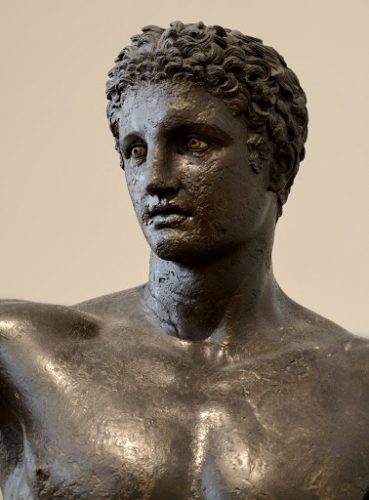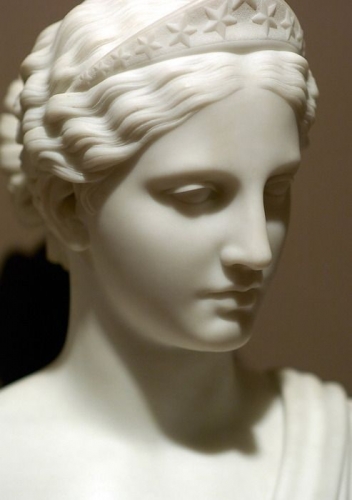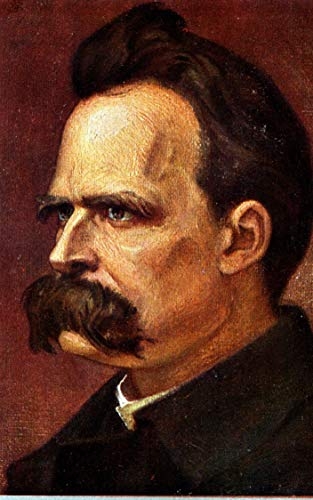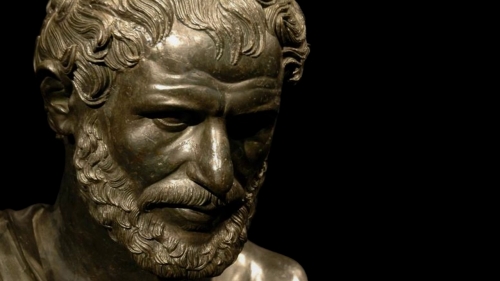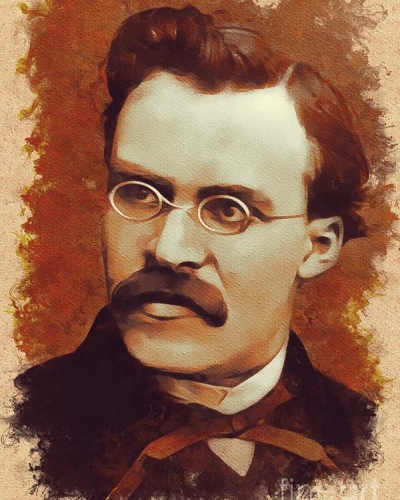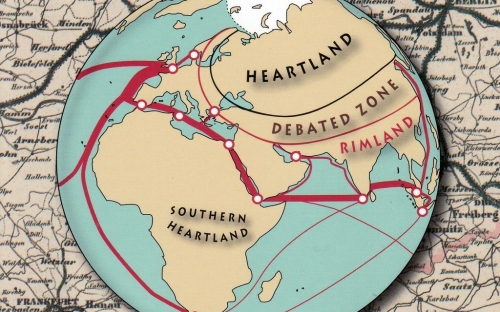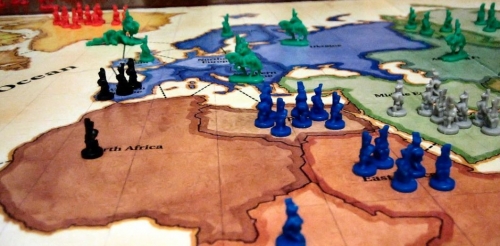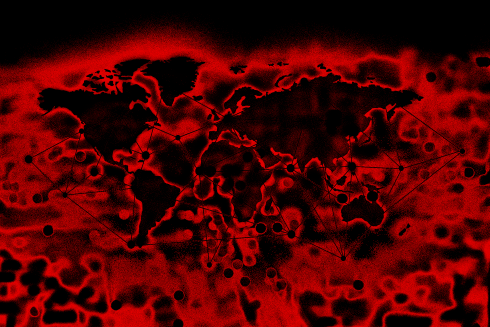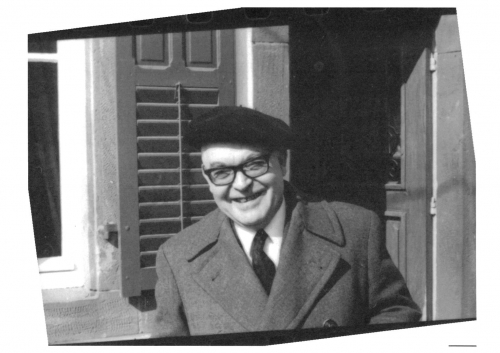
Hommage panoramique à Julien FREUND (1921-1993)
Maître Jean-Louis Feuerbach
Il y a un siècle, le 09/01/1921, naissait à HENRIDORFF en Moselle, Julien FREUND, grand penseur européen du 20ème siècle.
Avec ses baccalauréats en poche à 16 ans, il enseigne dès l’âge de 17 ans, pour subvenir aux besoins familiaux suite au décès prématuré de son père. Il fut professeur jusqu’à son départ à la retraite en 1988.
La sociologie fut son poste d’observation à l’Université de STRASBOURG II, la philosophie sa culture, la métaphysique sa méthode de hiérarchisation génétique. Il se définira lui-même comme spéculateur, celui qui observe (speculare) puis tisse les liens entre faits et vérité. Enfin, sous-pèse théorie et volonté.
Pour Julien FREUND penser signifie distinguer, comparer, hiérarchiser, séparer, réunir, classer. L’objectivité sera la condition de sa liberté. Aussi son œuvre est-elle, à la fois, recueil de saveurs, d’expériences, d’exemples et d’exposés de sa méthode.
Retiré dans son pagus de Villé, il y méditera, pensera et forgera ses concepts et théories et c’est là également que d’aucuns puissants viendront consulter le sage. Julien FREUND est une pointure hors classe. Sous son béret confluent le savant, le professeur, le résistant.

Dans le bourg de Villé...
Julien FREUND n’est pas un idéologue mais un théoricien de tout premier plan. Figure de proue du penser de l’inouï et du toujours là, il laissera à son décès le 10/09/1993 une œuvre gigantesque. Ses livres, ses articles, ses communications, ses interventions, ses préfaces, interviews ou traductions sont autant de briques de sa monumentalité. S’y ajoutent les rencontres, à table ou hors de table, les correspondances et malheureusement les travaux égarés, les inédits ou esquisses inachevées.
Discrètement, Julien FREUND n’aura fabriqué que des œuvres et des disciples. Ennemi farouche de la flatterie, il ne recherchera ni courtisans, ni dévots. Il croisera le fer avec le conflit, la violence, l’ennemi, la politicoclastie, la peur de la peur, les diasporismes, psychogogie et sociogogie ou la bêtise des suralimentés.
Il n’aura jamais d’opinion toute faite, se refusant de penser dans les catégories de droite et de gauche qui ne sont que suivisme et mimétisme servile des idées dominantes. Sa science était l’analyse comme recherche de vérité en tout et chez tous en se vainquant lui-même.
Il plantera ses crocs dans toutes les formes du savoir, toutes les formes du réel et de ses représentations, toutes les niches du vivant.
Ses théories sont production d’un amoureux du cœur politique, de la cité et des siens. Il s’agit de les défendre à l’aune du primat de l’amitié politique : BlutFREUNDschaft. Foi de gergoviote !
Le maître fera de la sociologie une science régénérée par la polémologie et n’aura de cesse que de désinfecter les concepts dénaturés. Sa lutte grandiose contre l’utopie sous toutes ses splendeurs fait la matière de son œuvre.
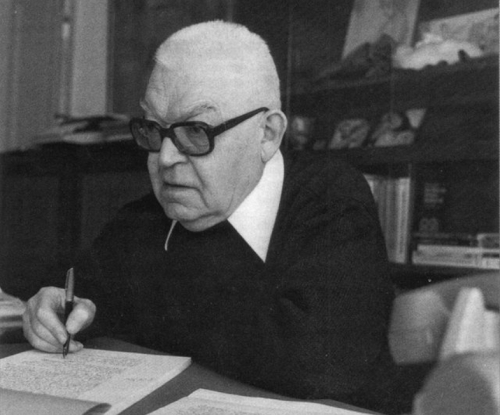
Voici quelques maximes de Julien FREUND à méditer :
- L’humeur est le quotidien de l’être,
- L’égalité est mise en hiérarchie de l’inférieur,
- Le privé est le lieu de nos libres choix,
- L’intellectuel est celui qui vit dans des catégories autres que celles dans lesquelles il pense,
- L’idéologie est une eschatologie sécularisée,
- L’homme politique est moral quand il est au service de la protection effective des citoyens,
- Tout politiser est impolitique,
- L’injustice ne consiste pas seulement à prendre plus que sa part mais aussi moins que sa part,
- Un Etat mondial sera nécessairement un état policier,
- La technique est serve,
- L’économique se ramène à la satisfaction des besoins,
- C’est l’ennemi qui vous désigne.
- Identité signifie fidélité à soi-même.
- Quand tout se vaut rien ne vaut.
- La barbarie est la seule issue de l’idéologie du progrès.
En ces temps freundiens de coïncidence des catastrophes, cinq thèmes saillants de son œuvre peuvent être évoqués :
- Le souci du Nomos (I),
- Le paradoxe des conséquences (II),
- Le rôle du tiers et du 3 (III),
- La lutte contre la décadence (IV),
- L’actualité de sa leçon (V).
Au final, Julien FREUND se rend éligible au rang de classique (VI).
I/ la théorie des essences et des instances.
Le 20ème siècle aura été le siècle des méthodes et non des doctrines. (La mise en agenda est encore plus patente au XXIème siècle). S’affrontent, dès lors, non des idées mais des systèmes.
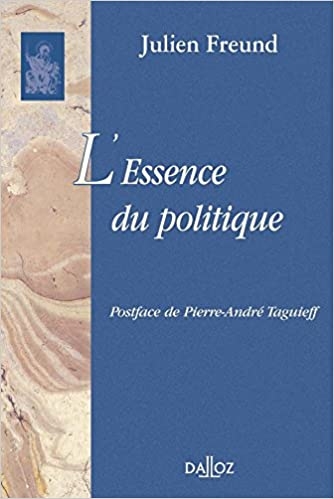 Julien FREUND disqualifie nazisme et communisme en phases préparatoires du totalitarisme de l’utopie. Il insupporte l’intolérable. Aussi, invente-t-il une théorie englobante du vécu des peuples comme acte constitutif de la contestation du projet collectif des idéologies mondiales. Il les dénonce comme sécularisation des monothéismes.
Julien FREUND disqualifie nazisme et communisme en phases préparatoires du totalitarisme de l’utopie. Il insupporte l’intolérable. Aussi, invente-t-il une théorie englobante du vécu des peuples comme acte constitutif de la contestation du projet collectif des idéologies mondiales. Il les dénonce comme sécularisation des monothéismes.
Sa théorie affronte directement et immédiatement le messianisme des engeances de domination, leurs violences, leur impérialisme. Elle est fondamentalement pharmacopée contre la peur de la peur, la contrainte psychique (hiérocraties), la terreur, la décadence. Sa composition est recomposition des activités des peuples, convoquant données, moyens et finalités pour les identifier comme impératifs (Il y a des libertés et non une liberté ; il y a des droits et non pas un droit ; il y a des histoires et non pas une histoire ; il y a des égalités et non pas une égalité) et déterminismes historiques.
Julien FREUND aura ainsi débusqué des constantes fortes, catégorielles et vitales dans les champs d’activité de l’expérience. C’est ce qu’il qualifie d’essences. Elles sont au nombre de 6 et rien que 6 : l’économique, l’esthétique, l’éthique, le politique, le religieux et le scientifique. Chaque essence a pour fondement une donnée, repose sur des couples de critères appelés présupposés (est un présupposé la condition d’exercice d’une activité comme condition constitutive, à défaut, elle ne pourrait se développer selon sa logique propre et sa finalité), poursuit une fin exclusive.
Pour Julien FREUND :
Les données ou fondements sont : l’économique qui a pour assise le besoin, l’esthétique qui procède du goût, l’éthique qui est le fait d’habiter un lieu, une maisonnée (ethos) en amis, le politique qui a pour cause le peuple politique, le religieux qui a pour fondement la mort, le scientifique qui vise la connaissance dans toutes les acceptions du terme.
Les présupposés ou critères, principes, structures opérant en couples sont : l’économique qui articule rareté et abondance, l’utile et le nuisible, le lien du maître et de l’esclave ; l’esthétique qui convoque la matière et le style, le plaisant et le fastidieux, la mise en relation de l’œuvre et des tiers ; l’éthique qui met en relation tradition et innovation, le convenable et la décence dans le commerce aimable et l’amitié aux personnes et aux choses ; le politique qui est constitutif des relations de commandement et d’obéissance, de séparation du privé et du public et de distinction de l’ami et de l’ennemi ; le religieux qui présuppose la distinction du sacré et du profane, du transcendant et de l’immanent ; la science qui intègre la relation entre quantité et qualité, nécessité et hasard, objectivité et subjectivité.
 Le présupposé se signale en ce qu’il polarise son opposé. Il fixe les limites entre lesquelles oscille le réel de la vie.
Le présupposé se signale en ce qu’il polarise son opposé. Il fixe les limites entre lesquelles oscille le réel de la vie.
Les finalités spécifiques de chaque essence sont : que l’économique poursuit le bien-vivre et le bien-être comme résultat de la satisfaction des besoins ; que l’esthétique est art du beau ; que l’éthique poursuit la manière d’être dans l’accomplissement du bien, du bien-faire, de l’habiter (ensemble) sous le toit de la maisonnée commune ; que le politique protège ses ressortissants par la concorde intérieure et la sécurité extérieure, (il est au service du peuple-politique pour garantir aux autres essences la possibilité de se développer, il doit le salut) ; que le religieux a pour finalité la quête de l’absolu et le salut individuel ; que le scientifique poursuit la recherche indéfinie et collecte l’accumulation de la connaissance pour elle-même, son but étant l’intelligibilité du réel. Chaque activité connaît un nombre variable de superstructures d’instances ou dialectiques, telles que le culturel, le pédagogique, le juridique, le social, le technique ou la politique. Chaque essence a une finalité de fonction élémentaire et exclusive. Elle est une réalité qui dure à travers le temps et qui ne disparaît pas sous l’action des circonstances. Elle fait l’histoire et est donc ineffaçable. Julien FREUND invite au strict respect du principe de distinction des essences et des instances. Il n’a de cesse de faire défense que l’une d’elle puisse accomplir l’office de l’autre : chacune étant spécifique, elles ne peuvent être réduites à l’une d’elle. Toute activité s’entend selon ses présupposés et non à partir de ceux d’une ou des autres.
L’empiètement d’une ou plusieurs essences, d’une ou plusieurs instances sur une ou plusieurs autres signe le passage à l’ère de la dévastation totalitaire.
Il stigmatise l’action oblique de l’économisme ou comment faire croire que l’enrichissement de quelques-uns ferait ruisseler la satisfaction des besoins de tous les autres. (Cujus economia ejus regio).
Si toute activité est aux prises avec des contradictions et doit les résoudre avec ses propres moyens, chaque activité ne peut résoudre que les siennes propres. Aucune ne peut et ne doit être la solution aux difficultés des autres. Nul ne saurait régler par les voies du politique des litiges portant sur des questions extrapolitiques, l’économique par la science, l’art par l’éthique… La science n’est compétente que dans les limites de ses présupposées. Hors de là elle n’est que petite science, pseudo-science ou simulacre de science. Il n’appartient pas à la science de définir le beau et le laid.
La concorde n’a lieu qu’au prix du politico-politique, de l’économique à l’économique, etc… Est donc totalitaire qui use de l’autorité politique pour intervenir arbitrairement hors de sa juridiction.
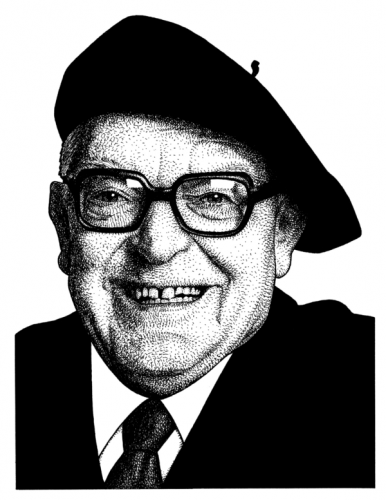
Julien Freund vu par l'artiste alsacien Jean-François Klotz.
Julien FREUND sait qu’aucune activité n’est angélique et que l’économie n’échappe pas à cette loi.
La théorie permet de qualifier déontologiquement ce qui est politique, économique ou autre dans tout phénomène ou de le disqualifier en tant qu’il ne l’est pas et serait autre chose.
La théorie permet enfin des reclassements fulgurants : Les monothéismes sont-ils des religions ou des programmes politiques, économiques ou sociaux ? Le capitalisme ou les droits de l’homme ne seraient-ils pas des religions ?
Par-delà cette grille de structuration anthropologique, Julien FREUND nous propose un système complet de fonctions cardinales polarisées.
Ce système fait socle de contre-création et mathématise un projet d’ordre. Un nomos en puissance.
C’est en ce sens que Julien FREUND est, à la fois, original et inégalable.
Il propose sa théorie à des fins pratiques pour entraîner à l’action.
Tout ce qui existe est formes et mise en forme. Sa création est œuvre d’art mise en état et architectonie politique mais où le tout n’est pas que politique. En termes heideggeriens la formule se ramène au il-y-a-de-l’être-là-avecque et pour.
Reste que le jeu dialectique qui fait l’histoire établit une hiérarchie entre les diverses activités.
Julien FREUND n’a pas eu le temps de solutionner ni la question de la hiérarchie des essences ni de la mise en couple desdites essences. Ne se pourrait-il pas que les essences de l’art, de la religion, du politique et de l’éthique recouvrent la 1ère fonction, le militaire, le technique, le technologique et le scientifique cohabitent au sein de la 2ème fonction tandis que l’économique, subsidiairement l’économie serait le champ de la 3ème fonction ?

Julien Freund en conversation avec Carl Schmitt.
II/ LE PARADOXE DES CONSEQUENCES
Julien FREUND a identifié un fait fondamental de l’histoire.
L’intention originelle de toute action ou entreprise ne se retrouve pas dans le résultat final. A l’expérience dit-il, le résultat de nos actions est rarement conforme à l’intention ou aux espoirs de départ, pour ne pas dire jamais. Les meilleures intentions peuvent entraîner des conséquences désagréables pour l’auteur et fâcheuses pour les tiers. Nul n’est donc chef des effets de ses décisions.
Il est des projets qui s’abîment en leur contraire. Le pouvoir qui voudrait se faire aimer à tout prix finit dans le mépris, se fait honnir et conspuer.
L’opposition du résultat et de l’intention sévit dans toutes les activités, mais surtout au plan politique. Aussi, personne ne saura prévoir quand et comment s’achève une entreprise. C’est le paradoxe des conséquences.
Ce tragique de l’action est fonction des aléas de la vie.
Il n’est, tout d’abord, obtenu à la fin que ce que l’on se donne au départ.
Le mensonge ou l’utopisme ne peuvent que produire méfiance et hostilité.
Ensuite, l’histoire est faite de négligences, d’omissions, de déceptions, de retournements et surtout d’antagonismes irréductibles.
Avec des moyens limités on ne peut accomplir des fins illimitées.
Ces fins sont elles-mêmes multiples et inconciliables.
Une fin ultime est nécessairement théorique ; elle ne peut entraîner que des conséquences elles aussi théoriques.
Aussi, faire croire que les effets attendus d’une action faite dans de bonnes intentions serait bonne ne peut être qu’imposture.
Ainsi, ceux qui voulurent supprimer le mur de Berlin pour lubrifier l’export des valeurs bourgeoises, auront importé le communisme du marché unique.

L’Union Européenne hisse-t-elle le pavillon du thalassocratisme proxéniste qu’elle devient le champ de foire de la traite humanitaire.
La religion des droits pave les autoroutes aux rois de l’homme.
Pis encore, il est des projets qui s’abîment en leur contraire (énandrodomie) : l’hyperglobalisme enclôt et confine ; l’écologisme pollue ; le spécisme déshumanise ; le décolonialisme conchie l’universalisme !
Rien ni personne n’y échappe.
Même l’utopie de plan collectif est pareillement soumise à cette loi historique.
Laïcité est cache-sexe du déchainement des paroisses contre les non-paroisses ; l’ultra sexisme genré de l’un est inimitisation de l’autre ; l’anti-racisme s’abîme en hyper-racisme. La cause de la critique-critique finit dans l’hypercriticisme autophage et autodévastateur. Etc…
L’avenir n’est donc jamais programmé, ni programmable. Prédiction et prophétie ne font pas prévision. En politique enfin, il n’y a ni espoir, ni désespoir absolus.
III/ L’APOLOGUE DU CHIFFRE 3 ET DU TIERS
Julien FREUND opinait que la sociologie s’ouvrait à partir du chiffre 3, parce que la relation sociologique a pour fondement numérique le chiffre 3 et que la dialectique met en jeu des contradictions que l’on peut dépasser intellectuellement dans un 3ème terme. Le couple qui procréée fait communauté à partir du nouveau-né.
![Sociologie_du_conflit___Julien_[...]Freund_Julien_bpt6k4806958w.jpg](http://euro-synergies.hautetfort.com/media/00/01/684065293.jpg) Si le 0 est mode de mise à zéro de ce qui précède, le non-lieu du désenchantement, du dépérissement, de la dépolitisation, soit non-Etre, le 1 est constellation de la monocratie, de la violence (par refus du combat), de l’asservissement. C’est le monde des échanges à somme positive : il n’y en a qu’un qui gagne.
Si le 0 est mode de mise à zéro de ce qui précède, le non-lieu du désenchantement, du dépérissement, de la dépolitisation, soit non-Etre, le 1 est constellation de la monocratie, de la violence (par refus du combat), de l’asservissement. C’est le monde des échanges à somme positive : il n’y en a qu’un qui gagne.
Le 2 est cosme du dualisme donc du conflit de personnes, de valeurs, de systèmes de valeurs, mais aussi de l’amitié et de l’amour, de l’ami et de l’ennemi, de la terre et de la mer.
Le 3 est l’empire du tiers, celui qui rend possible la relation de majorité à minorité, de gouvernants à gouvernés, de l’individu au groupe. La reconnaissance du tiers assure la stabilité et la concorde. L’irruption du tiers conjure la relation au polémogène et au conflictuel. Le tiers c’est l’arbitre, le médiateur, le juge, l’intercesseur, l’avocat. Il domestique les contraires, canalise leur violence, lubrifie l’agonalité.
Dans une guerre, le tiers peut surgir et modifier le rapport de force bilatéral.
Ce tiers est la plaque tournante de toutes les alliances et des configurations possibles de coalition. Itou au plan social, électoral ou concurrentiel.
Toute alliance a pour fondement le tiers. La présence ou l’absence de tiers bouleverse les conflits. Le tiers, a, en effet, le choix de la combinaison amitié, hostilité ou indifférence. Soit il rompt la dualité de l’ami et de l’ennemi ; soit il lubrifie et impose entente, compromis, transaction.
C’est lui qui fait la paix ou fabrique le compromis (la plus belle invention des hommes avec la roue).
Ainsi considéré, il pousse ou empêche l’affrontement en équilibrant, rééquilibrant ou déséquilibrant. C’est à l’aune du tiers encore que se mesure la tolérance ou l’intolérance. La tolérance se fonde sur le tiers inclus, c’est-à-dire le droit des tiers à exprimer opinion, pensée, projet. A l’inverse, l’intolérance participe du tiers exclu.
Le 3 et le tiers opèrent césure d’avec le 2 mais ouverture vers le 4 et plus.
Ils permettent le passage dans le non numérable, le qualitatif et la mise en forme-forme.
La pensée triadique perce une brèche décisive dans l’habitus intellectuel de la doxa du monopolaire et du bipolaire.
La quête du tiers est donc maxime politique qui allie ou sépare, fédère ou oppose, associe ou dissocie. Le tiers peut aussi être l’instigateur ou le profiteur du conflit, celui qui pousse à l’amitié ou à la haine.
A cet égard, au sein de l’instance culture et dans l’essence de l’économique, le tiers est-il l’argent. Il y est le référent général et abstrait, le convertisseur et le régulateur, le valorisateur et le dévalorisateur. Il assume la fonction de différenciation et d’indistinction. Comme fait de culture, la mise en abstraction numérique intellectualise et acculture, au calcul, à la machination. Il est le tiers vicieux du vice de la triple morale du psaume libéral, qui veut faire croire que 2 + 2 = 5. Mais avec ses sous-jacents fabrique le zéro ou le moins un ! ce qui induit la question du technique et surtout du technologique.
Pour Julien FREUND, le technique est la dialectique des dialectiques. Elle opère par combinaison des moyens, des agencements et des procédures.
 Le technique est donc médiation mais elle est serve en tant qu’elle est au service de la science, de la puissance, de l’esthétique, du politique, de la culture, de l’économie, etc… et leurs fins. La technique est alors la décision de ceux qui l’utilisent, la détiennent ou la précipitent dans l’antagonisme des fins. Associative ou dissociative, quelle est-elle ? Serait-elle nouveau rapport de commandement à obéissance, de maître à esclave ou de satisfaction des besoins qu’elle créerait par elle-même ? Serait-elle, au final, l’essence des essences ? Elle n’est dès lors pas neutre, ni donc le tiers attendu. Tout change avec la technologie. Celle-ci s’arroge le droit de poser ses propres fins, présupposés et moyens. Son autonomisation téléologique et sa dimension normative face au politique, à l’entreprenariat, à l’éducateur ou au militaire est gros d’une conflictualité avec les propres exigences téléologiques de ces dernières activités.
Le technique est donc médiation mais elle est serve en tant qu’elle est au service de la science, de la puissance, de l’esthétique, du politique, de la culture, de l’économie, etc… et leurs fins. La technique est alors la décision de ceux qui l’utilisent, la détiennent ou la précipitent dans l’antagonisme des fins. Associative ou dissociative, quelle est-elle ? Serait-elle nouveau rapport de commandement à obéissance, de maître à esclave ou de satisfaction des besoins qu’elle créerait par elle-même ? Serait-elle, au final, l’essence des essences ? Elle n’est dès lors pas neutre, ni donc le tiers attendu. Tout change avec la technologie. Celle-ci s’arroge le droit de poser ses propres fins, présupposés et moyens. Son autonomisation téléologique et sa dimension normative face au politique, à l’entreprenariat, à l’éducateur ou au militaire est gros d’une conflictualité avec les propres exigences téléologiques de ces dernières activités.
Gageons que l’hégémonie du technologique fera exploser le plan collectif de l’utopie, mettra à néant l’idéologie moderne et installera l’inégalitaire et fabriquera de nouveaux dieux et titans ! Ce qui ouvrira la voie à une nouvelle connivence entre la technologie et la mentalité européenne native.
S’en suivra nouvelle redistribution des cartes, nouvelles intuitions du monde, nouvelles religions, nouvel l’art, nouvelles politiques, nouvelles économies…Le défi de la pensée est dans l’inversion des inversions.
IV/ LE PENSEUR DE L’ANTI DECADENCE
Pour Julien FREUND le concept de décadence est « un concept historique ». Ce qui veut dire d’abord qu’il n’existe pas de décadence absolue. La décadence appartient au monde de l’existence représentée et non à celui d’un monde non existant préfiguré comme devant exister un jour. Aussi le contraire de décadence n’est pas le progrès mais la germinalité.
Ensuite, l’idée de décadence implique une situation qui est en dépression, en voie de détérioration par rapport à un état antérieur qui était en état d’extension, de puissance et d’harmonie d’entre les essences.
Enfin, la décadence n’est pas un terme, une fin de l’histoire, mais la clôture historique d’une civilisation. La décadence ouvre un interrègne en attendant qu’un autre type de civilisation lui succède.
Julien FREUND s’est longuement penché sur la décadence de l’Europe.
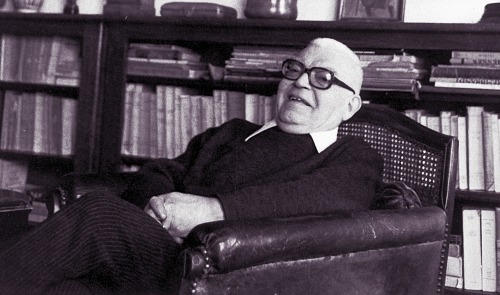
Il note à son égard l’épuisement énergétique, la migration de ses instincts vitaux, le désenchantement. Singulièrement il prend acte que l’Europe a quitté l’Europe, qu’il n’y a plus de préjugés européens, que les Européens ont perdu jusqu’à la symbolique agressive.
Ils passent leur temps à s’unir pour s’unir comme les faibles alors que l’union naît de la volonté de réaliser une œuvre commune. Ils n’ont plus le sens ou la posture géopolitique et geomythique.
Les Européens refusent de désigner l’ennemi. Ils oublient que l’ennemi les désigne. Or si leur civilisation succombe c’est qu’elle est victime de ses ennemi.
Ces derniers ne cachent nullement leur dessein d’anéantissement. Et lui fait perdre le Nord. Lui prendre le Septentrion. Moissonner sa sagesse.
Les Européens, par ricochet, intègrent dans leur comportement des incitations à la lâcheté ensuite précisément du dressage idéologique par tromperie sur l’ennemi fraude de l’ennemi et colonisation.
Pis encore, l’Europe se pique de se culpabiliser collectivement. Elle revendique la dépravation comme morale.
A ne plus vouloir d’ennemi, elle demeure l’ennemi pour ses ennemis. Elle a beau manifester bienveillance, pacifisme et humanitarisme.
Julien FREUND prend le soin de départir la décadence endogène d’avec la mise en décadence-décadance exogène.
La décadence revient à dissocier les fonctions très précisément opérer ou subir rupture au niveau de la 1ère d’elles, divorce du politico-religio-esthétique, l’obésité de l’économie ou l’éthisme de contrebande.
Ainsi, par application de la théorie des instances et des essences, la décadence s’analyse en domination des instances sur les essences. La politique prostitue le politique ; la technique met au pas ; le droit-loi oblige, discipline, déontologise dans la légalité de l’illégitimité ; la culture ritualise la programmatique des contraires ; le social thésaurise.
Il stigmatise ensuite la décadence par les Européens eux-mêmes en tant que processus accepté de défiguration, répudiation, dévitalisation des formes de vie, principes et fondements de leur civilisation par humanitarisme. Qui est tricherie.
 Mais surtout, Julien FREUND croise le fer avec l’entreprise de mise en dédacence-décadance. (Théorie du choc, grande inversion, levées des armées de réserve du capital depuis les extrémités de la terre) et l’entreprise de prise qui guigne le territoire, la munificence, la magnificence des Européens, en même temps qu’elle orchestre leur dépossession, dévastation, élimination. (Précisons qu’Europe a pour radical le verbe ropein qui signifie débroussailler, sarcler, plumer, piller… !).
Mais surtout, Julien FREUND croise le fer avec l’entreprise de mise en dédacence-décadance. (Théorie du choc, grande inversion, levées des armées de réserve du capital depuis les extrémités de la terre) et l’entreprise de prise qui guigne le territoire, la munificence, la magnificence des Européens, en même temps qu’elle orchestre leur dépossession, dévastation, élimination. (Précisons qu’Europe a pour radical le verbe ropein qui signifie débroussailler, sarcler, plumer, piller… !).
Voyez la religion de l’Etat qui est la guerre civile de religion.
L’Etat sait, en effet, qu’il ne peut garantir les promesses et présupposés qu’il pérore. Il échoue même dans le faire-croire. De là sa violence augmentée. S’y ajoute que le gouvernement des peuples est affaire théocratique et non plus politique.
L’obsession humanitariste désigne l’ennemi intérieur. Elle fait de l’Etat un commis de la violence privée. Et cette violence de répéter la concurrence de violence sous le patronage culturel de cette violence.
Elle œuvre à la dissociation et verse dans l’impolitique, l’anti-politique, la politicoclastie. Le statut de citoyen est bouleversé. Le ressortissant politique de la cité est banlieusé, déculturé de force, acculturé à une théologie violente, matinée de traites financière (la dette), égalitaire et anthropologique, discriminé socialement, racisé et déracisé, par les suprémacismes publicitaires, traqué par les diasporas sur son propre sol.
L’Etat fait sa course théoidéologique contre le peuple, contre ses citoyens pour compte d’autrui. C’est l’apparente nouveauté de la situation. Il n’en est rien. Loin de trahir il accomplit sa mission. L’Etat a vocation d’accoutumance à l’humanitaroïté. Clovis a prêté serment à la doctrine magique de la décadance et tous ses successeurs avecque ! L’état de l’Etat est de servir l’hétérotopisation, de privilégier l’altérité étrangère et de maltraiter l’indigénie autochtone.
Là sont métaconstitution et prérequis de la ré-priva-blique.
Ici on hystérise la proxénie. La migrance est le star-système de la jet secte. La finalité intrinsèque va à la suppression du peuple politique. L’ennemi total c’est le peuple : les francs(s)ais, les Blancs, les boréens, les rétifs à l’hétérogénisation.
Le paradoxe veut toutefois que la civilisation moderne entre elle-même de plain pied dans la décadence et la conflagration d’avec le concept de progrès. Ainsi, le vice sature, la perversion viralise. S’il n’y a plus que des individus il n’y a pas même de société, et la souveraineté va aux gangs des rois de l’homme.
Pour Julien FREUND l’idée de décadence indique que tout système, tout antisystème, tout concept, toute conception du monde vont s’effondrer, être balayée, évacuée.
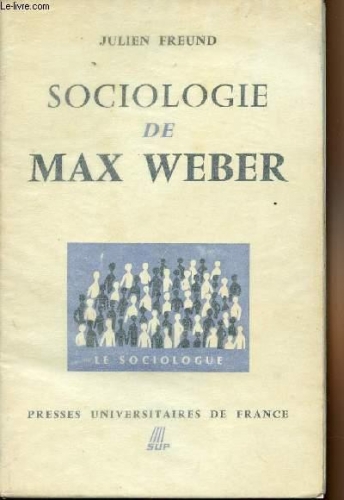 Une idée archaïque peut toujours reparaître sous d’autres formes ; ce que l’homme a pensé, il peut à nouveau le penser ; ce qu’un peuple a fait il peut à nouveau le faire. La décadence appelle à la renaissance. Le destin est dans l’origine.
Une idée archaïque peut toujours reparaître sous d’autres formes ; ce que l’homme a pensé, il peut à nouveau le penser ; ce qu’un peuple a fait il peut à nouveau le faire. La décadence appelle à la renaissance. Le destin est dans l’origine.
A une religion qui se meurt succède une autre religion. Le sursaut charismatique gros d’un nouvel âge est toujours là. L’aventure d’avec l’histoire peut prendre ou reprendre à tout moment.
Il suffit d’une étincelle pour raviver le feu. Tous ont rendez-vous avec le tragique, l’entropie, l’enandrodomie, l’hétérotélie. Une théocratie qui aura perdu son dieu en route est nécessairement bouleversée.
Sa déseschatologisation est inévitable. La fin du monde biblocentré arrive à grands pas. Le messianisme dévisse de mythe en philosophie, de technique en routine. Voyez la mise en ballet des écuries régulières et séculières des monothéismes et la promotion népotiste du mahométisme. Les schémas mentaux explosent.
Les peuples sis en Europe furent abîmés, épuisés, disqualifiés en ayant été amenés à épouser des causes, soutenir des conflits, se prostituer à des intérêts, valeurs et mythes qui ne sont pas les siens.
V/ LA GRANDE LEÇON ET LE CAS PRATIQUE DU MOMENT
En posant sa théorie des essences et des instances, Julien FREUND aura pensé un système contre les anti-systèmes. Son œuvre se lit comme un traité du permapolitique et de macropolitisme. Sa philosophie confine en savoir absolu pensé dialectiquement. Mais gardons-nous de ranger Julien FREUND dans la seule armoire de la politique car le souci du Maître de VILLE aura été de penser et de répondre à la nécessité métapolitique et métaphysique.
Julien FREUND est décolonisateur. Il inverse l’inversion et remet les choses à l’endroit. Il arrache les masques. Son code secret est l’éthique du succès. Mais c’est une grammaire de retour à la mesure : la mésocratie. Julien FREUND est un mésocrate. Mais non point un misocrate. Sa structure narrative vise au renversement des idioties disciplinaires. Le cahier des charges de son offre théorique s’articule comme suit : il faut affirmer les principes fondamentaux pour défendre et sauver l’Europe et ses peuples contre leurs ennemis et défier la mise en décadence-décadance.
Fondamentalement, l’enveloppe des essences est le liquide amniotique desdits peuples qui protège leur substance primordiale.
Au commencement il y a les 6 essences (l’artistique, l’économique, l’éthique, le politique, le religieux et le scientifique). Une essence est une activité catégorisée, critérisée et détectable par une donnée, des présupposés et une finalité spécifique. Ces activités sont premières et primaires, vitales et constantes.
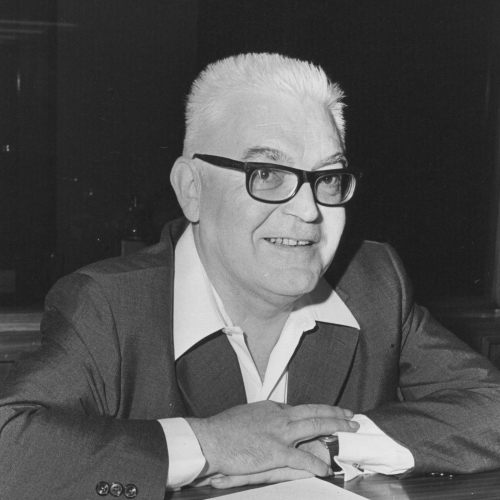
La mise en relation de ces essences donne lieu à des activités secondaires ou dialectiques. Il s’agit des instances au nombre de 5 : le culturel, le juridique, le pédagogique, le social et le technique. Nous y ajoutons la politique par souci de clarification.
Ces essences sont des outils conceptuels visant à dominer l’expérience et à sanctionner les débordements, insuffisances ou carences. Mésocratie harmonique toujours erigée en système.
Julien FREUND n’aura eu de cesse que de scruter les oscillations des présupposés par lui identifiés, les mouvements des essences et des instances, à la fois entre elles et contre elles.
Sa grille expertise les dynamiques des peuples ou leurs morbidités. Et de leur appliquer son curseur, sa grammaire, son contrôle.
Le signe manifeste de la décadence est l’hégémonie d’une essence sur toutes les autres ou la domination des instances sur les essences. Tel est le cas si la politique prostitue le politique, si le droit déontologise la légalité de l’illégitimité ou si la technique met au pas. Car alors les essences sont expulsées de l’être et les instances gèrent la marche forcée vers le non-être. De même Julien FREUND développera également une conception du droit inouïe de justesse. Parce qu’irriguée de la musicalité du juste. Chaque citoyen a vocation à prendre sa part ; est injustice celui qui prend plus ou moins que sa part ; la part prise par le créancier diasporique est acmé de l’illégitime.
L’économisme fit muer l’économie en religion et commuer l’économique de la satisfaction des besoins à religion du besoin de satisfactions.
Le politique fait irruption quand survient une variation dans les associations et les dissociations. A partir d’un certain seuil, l’effet de cliquet opère bascule. La quantité devient qualité. Telle opinion, telle image, tel slogan fédèrent des amitiés nouvelles, les relient autour d’une désobéissance, défie le commandement et désigne l’ennemi.
Le constat de l’entrée en politique-politique est aisé. La vision de la rue suffit si à la lutte qui y préside s’ajoutent masses, répétitions, slogans et violence... A l’inverse, une procession de robins n’est pas politique.
Tout autre est la montée au front d’une sainte alliance eschatologique qui agite « Grande remise à zéro », coronarise une pandémie et fait déclaration de guerre aux Etats-Nations. Ce « projet collectif » d’initiative privée, purement privative, vise à agresser les peuples dans leur intégrité physique, dans leurs organismes de protection sanitaire, dans leurs budgets sociaux, dans leur fonction économique et dans leur souveraineté financière. Pareille décision est nécessairement politique.
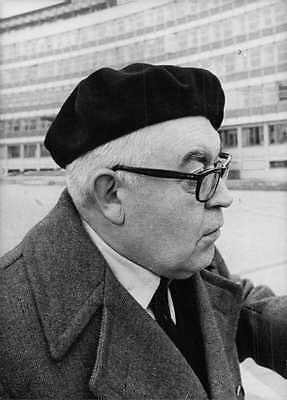 Julien FREUND a en stock 10 catégories d’objections-obstacles à ces menées :
Julien FREUND a en stock 10 catégories d’objections-obstacles à ces menées :
En premier lieu, cette manifestation d’hostilité caractérisée est hautement politique quand bien même procéderait-elle d’un déplacement à l’extrémité du pôle privé au fondement d’une « opinion » théologique catapultée, « commandement » motorisé ;
En second lieu, les peuples cibles sont « livrés au regard de l’ennemi » ; c’est donc lui « qui nous désigne » comme l’ennemi d’icelui ; il devient dès lors le nôtre ;
En troisième lieu, ceux qui de droit et par fonction ont mandat et « pouvoir de nous protéger » mais s’abstiennent, défaillent ou s’y refusent, se disqualifient ; ils dévissent dans « l’impolitique ».
En quatrième lieu, la décision de l’ennemi de « faire la guerre » opère passage à la guerre privée donc à la « guerre civile de religion » - la pire de toute ;
En cinquième lieu la répression policière de la résistance, sous quelque moyen ou prétexte que ce soit, devient « violence privée oppressive en tant qu’elle voudrait éliminer ou empêcher tout conflit » en cette occurrence ;
En sixième lieu, « le rapport de force du fort au faible » est renversé ; mais le pouvoir ennemi d’indirect (potestas indirecta) devient direct (directa) donc dévoilé, ostenstible, visible – immédiatement politique.
En septième lieu, se constate une montée aux extrêmes de la « peur de la peur », de la « contrainte psychique » et de dressage techno-vétérinaire aux effets insoupçonnés pour les méchants organisateurs : toute dénaturation de l’animal-homme est grosse de sur-naturation qui se déchaînera immanquablement contre les élites nolochistes ;
En huitième lieu, la cadence s’actualise en décadance comme praxis de la destruction, de la déconstruction, de la dévastation ; soit « les formes politiques extrêmes de la décadence » ;
En neuvième lieu, « l’éthique de la conviction » mondialisée s’élève à la criminalité cosmopolitiste ; la guerre à l’humanité est crime éponyme ; le massacre de classe demeure « massacre » ;
En dixième lieu : la tyrannie des valeurs signe machination de mise en non-valeur.
N’oublions jamais que valeur vient du latin valor et signifie force de vie, énergie de vie, puissance. Vaut ce que pose un peuple ou lui impose l’ennemi.
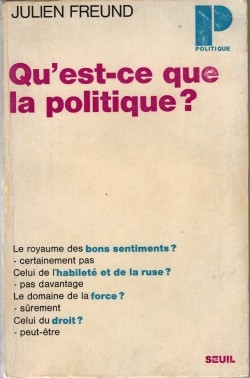 D’aucuns voudraient-ils commuter la condition humaine en condition juridique vers le zoologique ou la chosification, Julien FREUND moqueur tragique de leur objecter que toute entreprise demeure soumise au paradoxe des conséquences et que tout plan collectif peut entrer en décadence jusqu’à s’effondrer. Ainsi entendue décadence n’est autre chose que la sociologisation de la chute de la modernité, l’agonie de l’aire actiaque, donc la clôture du temps de l’historiette du désert.
D’aucuns voudraient-ils commuter la condition humaine en condition juridique vers le zoologique ou la chosification, Julien FREUND moqueur tragique de leur objecter que toute entreprise demeure soumise au paradoxe des conséquences et que tout plan collectif peut entrer en décadence jusqu’à s’effondrer. Ainsi entendue décadence n’est autre chose que la sociologisation de la chute de la modernité, l’agonie de l’aire actiaque, donc la clôture du temps de l’historiette du désert.
Cette loi de l’histoire conduque et sanctionne toute intention et action y compris les menées décadentistes. Ainsi, les dystopistes, déconstructivistes ou ravageurs soromanes échoueront. Leur one-way versera dans le cul de sac. Leur prophétie de s’étioler comme rots dans le cosmos. Par voie de conséquence, la décadence peut devenir elle-même une condition de renouvellement de la pensée et de l’action donc de l’histoire. La fin d’un type de civilisation percluse d’inversion ne peut que s’inverser dans l’inversion. La théorie de la décadence est boule des oscillations, ondulations, rétro ou rotofagies du tragique. A nouveau, décadence signe fin d’une cabbale non celle du monde. L’inversion d’inverser l’inversion. L’économisme ne saurait jamais fusionner l’autorité spirituelle et l’autorité temporelle. Une fonction ancillaire ne saurait jamais prétendre à faire fondement. Elle reste une technique de prise. Une valeur unique n’est pas valeur.
La métaphysique de l’illimité qui s’arcboute sur une seule essence ou une seule instance, tel un pied de biche, dévoile l’effraction de son réductionnisme, sa monocult-ure, son monothéisme du marché !
VI/ LA FIGURE DU CLASSIQUE
Julien FREUND doit être calibré comme un classique du politique (du latin classis troupe de première classe).
Il fut un résistant inflexible sa vie durant contre tous les envahissements, toutes les impostures et toutes les pollutions de l’esprit.
Servi par une rhétorique implacable et de son rire ravageur, Julien FREUND s’imposait par sa pétulance, sa pertinence et sa profondeur.
Un facies de celte rayonnant, un prénom d’empereur romain, un nom dialectiquement contraire d’ennemi.
L’amitié politique restera chez lui la finalité des finalités : primat germinal.
Le vrai vaccin contre l’impolitique, l’anti-politique ou la politicoclastie, c’est lui ; la défense immunitaire faite pensée politique c’est encore lui. Le classique c’est toujours lui.
Il a passé sa vie à enseigner – instituteur à 17 ans -, à professer – dans le secondaire puis à l’Université de STRASBOURG -, à plaider pour la cause des peuples d’Europe. Ce géant aura eu une vie agitée, trépidante, dangereuse. Il fit la guerre en partisan. Il connaîtra le choc des incultures. Il fut surtout le pôle de la résistance au pouvoir culturel.
Il est totalement méconnu que Julien FREUND jouera un rôle de sage. Les puissants vinrent le consulter, sollicitèrent son arbitrage ou recueillirent son expertise. Les amoureux de sa sagesse, accoururent à Villé pour s’y abreuver. Lui encore se repaîtra des échanges, du ressenti, des sentiments de ses concitoyens. Julien FREUND incarne ce savoir gravitationnel qui fait, à la fois, la physique, la métaphysique et l’impérissabilité de sa conception du monde. Ses intuitions et théories font sens, donnent sens et fournissent les concepts opérationnels pour la lutte.
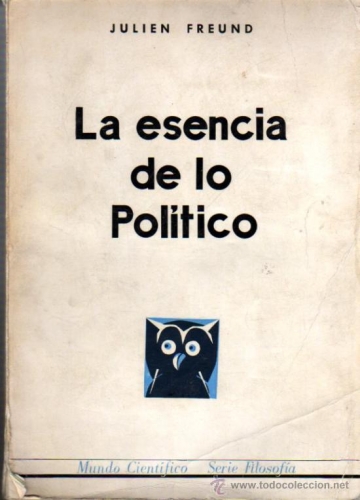
Au vu de ce qui précède, il est aisé de constater que la pensée de Julien FREUND est toujours valable. Elle porte date mais n’est pas datée. Elle est de toujours. Elle relève de la sagesse classique. Elle fait récit. Elle est puits de science. Le Freundisme est la technique qui fonctionnalise la théorie des essences et des instances. Le rôle du classique est d’être à l’affût du princeps de son époque et de proposer le principe ordonnatif. Le classique est celui qui devient grand dans le fond de son essence, voit les grandes choses de ses essences et entre dans leur suite. Fondamentalement ainsi, le politique ne saurait dépérir. Il est insurmontable, incompréssible, incontournable. Il est essence. Elle pèse. Parce que nécessité vitale. Pour lui encore l’univers est indéterminable. Il n’y a pas de sens de l’histoire. L’histoire ne suit pas un cours obligatoire. Là est la banalité supérieure du Freundisme, c’est-à-dire génie.
Le classique est le fils de son temps et de l’espace qu’il habite. Il est armé de la lucidité de l’expérience historique. Il fournit un fil d’Ariane pour guigner le salut collectif.
Le classique envisage toujours le pire pour qu’il n’arrive jamais. Il fabrique donc les scénarii et pense les moyens pour faire face en cultivant les ressources intraspécifiques. Car le maître de Villé aura fait de la politique, affronté l’anti-politique et tutoyé l’impolitique. Il aura retenu que la pesanteur du politique est dans la lutte contre l’ennemi.
L’actualité, la pertinence et le succès de la pensée de Julien FREUND sont inversement proportionnels à l’inactualité, au silence et à la censure pratiquées par les appareils de la manipulation idéologique.
Au vrai Julien FREUND aura mobilisé, tout au long de sa vie, son énergie contre la malfaisance et la malpensence. Ses concepts sont des armes. Il a toujours soutenu que poser s’est s’opposer. Aussi, sa pensée est-elle, à la fois, affirmation de son gai savoir et révocation de l’illégitimité du monde contemporain.
Comme champion de la limite et de la mesure, il ouvre un au-delà au marigot de l’illimité et la démesure, c’est-à-dire l’ultra-capitalisme, l’humanitarisme ou l’hyper-racisme de l’anti-racisme.
Il nous force à penser l’ennemi en son entreprise de cabbale, ses valeurs boursières, sa tyrannie dévastatrice, son aliénation aliéniste. Il nous présente une autre méta-constitution, alternative et franche de toute théologie mortifère. Sa philosophie n’est pas idéaliste mais vaut grammaire de conquête et de re-conquête c’est-à-dire orthographie de la puissance politique. Son œuvre est donc un traité de contestations de la mise en marchandise.
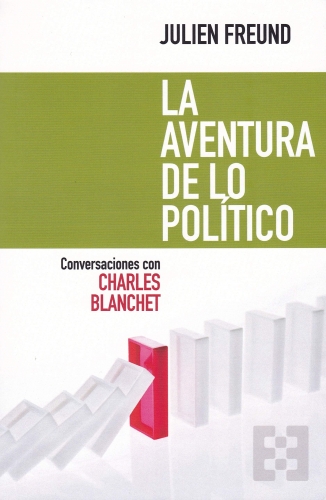
Julien FREUND pense la totalité du nomos politikon. L’extrême amitié pour les siens l’aura poussé à inventer le peuple politique comme figure de l’alternative. Parce qu’il est le penseur non aligné par excellence de l’ordre néo-libéral, il nous invite à imaginer et forcer la scission d’avec la mise en ordre économiste comme possible d’une autre forme historique que la cage d’acier du capitalisme. Sa théorie des essences et des instances est alors piédestal pour penser, construire et produire cette alternation politico-historique. Son grand mérite aura été d’oser penser le sens de la possibilité d’une possibilitas.
Son programme total est le réenchantement par la repolitisation. Son offre est toute de panache et d’aspiration à la cité du politique-politique.
Julien FREUND se sera fait un devoir cavalier et heuristique envers la cité en tant que toit physique et métaphysique. Freund docet Boreanos.
Vive la FREUNDopolis !
Jean-Louis FEUERBACH.
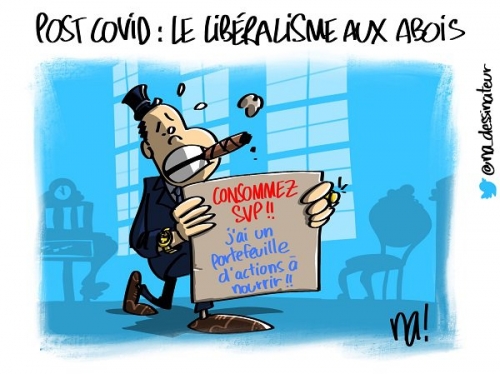
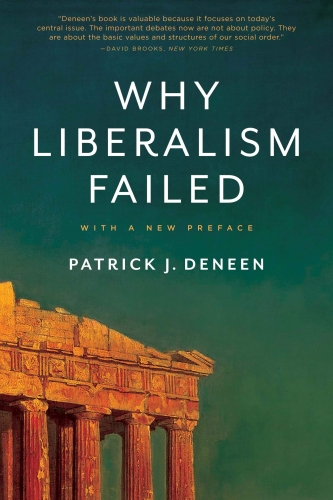
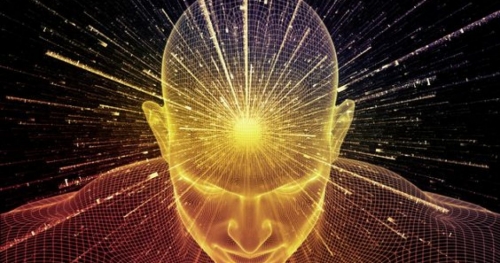




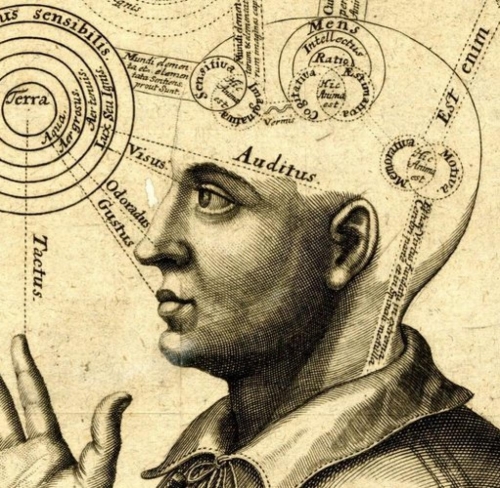
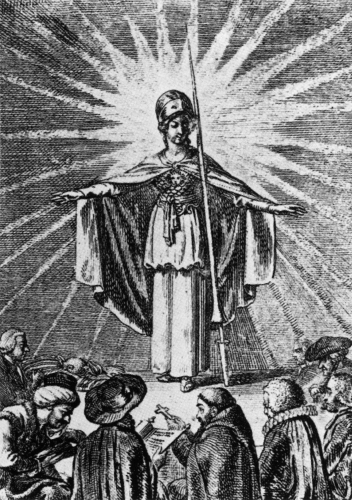
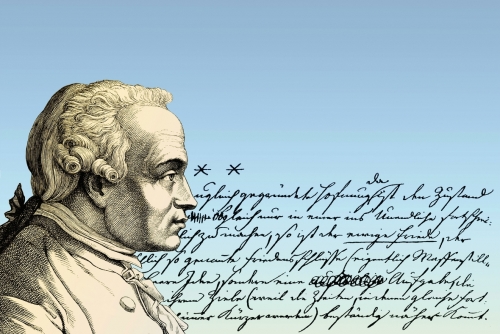

 del.icio.us
del.icio.us
 Digg
Digg

 Embarrassés par un tel désastre, ces hommes "civilisés" ont dû faire face au fait que leur seule arme et leur seul espoir était la volonté, et leur seul monde les camarades du front. Derrière eux se cachaient les fiers idéaux des Lumières. Le jeu de la vie dans les bonnes formes et la rhétorique pamphlétaire parisienne étaient enfouis dans la boue de Verdun et de la Galice, dans les rochers du Carso et dans les eaux froides de la mer du Nord.
Embarrassés par un tel désastre, ces hommes "civilisés" ont dû faire face au fait que leur seule arme et leur seul espoir était la volonté, et leur seul monde les camarades du front. Derrière eux se cachaient les fiers idéaux des Lumières. Le jeu de la vie dans les bonnes formes et la rhétorique pamphlétaire parisienne étaient enfouis dans la boue de Verdun et de la Galice, dans les rochers du Carso et dans les eaux froides de la mer du Nord. Jünger alla beaucoup plus loin ; il comprit que ce conflit avait détruit les barrières bourgeoises qui enseignaient l'existence comme une recherche de la réussite matérielle et l'observation de la morale sociale. C'est alors que les forces les plus profondes de la vie et de la réalité ont émergé lors du conflit, ce qu'il a appelé les "élémentaires", des forces qui, par une mobilisation totale, sont devenues une partie active de la nouvelle société, composée d'hommes jeunes et durs, une génération abyssalement différente de la précédente.
Jünger alla beaucoup plus loin ; il comprit que ce conflit avait détruit les barrières bourgeoises qui enseignaient l'existence comme une recherche de la réussite matérielle et l'observation de la morale sociale. C'est alors que les forces les plus profondes de la vie et de la réalité ont émergé lors du conflit, ce qu'il a appelé les "élémentaires", des forces qui, par une mobilisation totale, sont devenues une partie active de la nouvelle société, composée d'hommes jeunes et durs, une génération abyssalement différente de la précédente.
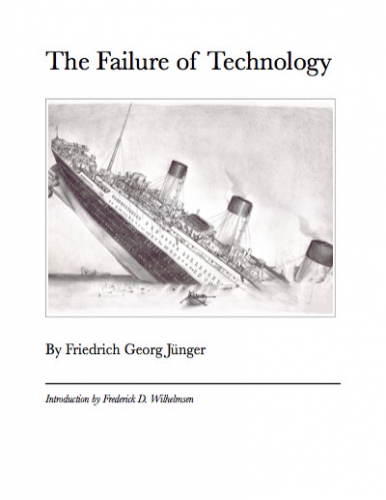 Au début des années 1930, une série d'écrivains sont apparus en Europe, surtout en Allemagne, dont les œuvres se référaient à la relation entre l'homme et la technique, où la volonté comme axe de la vie résulte en une constante. C'est le cas de L'homme et la technique d'Oswald Spengler - qui reprend les prémisses nietzschéennes de La volonté de puissance -, de la philosophie de la technique de Hans Freyer, de l’idée d’une perfection et de l'échec de la technique de Friedrich Georg Jünger - frère d'Ernst - et des séminaires du philosophe Martin Heidegger, tous contemporains du Travailleur, ouvrage précité. (Le livre de son frère Friedrich a été publié immédiatement après la Seconde Guerre mondiale, mais il avait été écrit de nombreuses années auparavant et les vicissitudes du conflit l'ont empêché de voir le jour). Mais ces questions n'étaient pas uniquement du monde germanique, car il ne faut pas oublier les futuristes italiens dirigés par Filippo Marinetti, ni Luigi Pirandello de Manivelas, les écrits du Français Pierre Drieu La Rochelle - comme La Comédie de Charleroi - et le film Modern Times, de Charles Chaplin.
Au début des années 1930, une série d'écrivains sont apparus en Europe, surtout en Allemagne, dont les œuvres se référaient à la relation entre l'homme et la technique, où la volonté comme axe de la vie résulte en une constante. C'est le cas de L'homme et la technique d'Oswald Spengler - qui reprend les prémisses nietzschéennes de La volonté de puissance -, de la philosophie de la technique de Hans Freyer, de l’idée d’une perfection et de l'échec de la technique de Friedrich Georg Jünger - frère d'Ernst - et des séminaires du philosophe Martin Heidegger, tous contemporains du Travailleur, ouvrage précité. (Le livre de son frère Friedrich a été publié immédiatement après la Seconde Guerre mondiale, mais il avait été écrit de nombreuses années auparavant et les vicissitudes du conflit l'ont empêché de voir le jour). Mais ces questions n'étaient pas uniquement du monde germanique, car il ne faut pas oublier les futuristes italiens dirigés par Filippo Marinetti, ni Luigi Pirandello de Manivelas, les écrits du Français Pierre Drieu La Rochelle - comme La Comédie de Charleroi - et le film Modern Times, de Charles Chaplin.
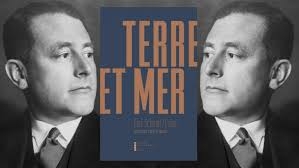
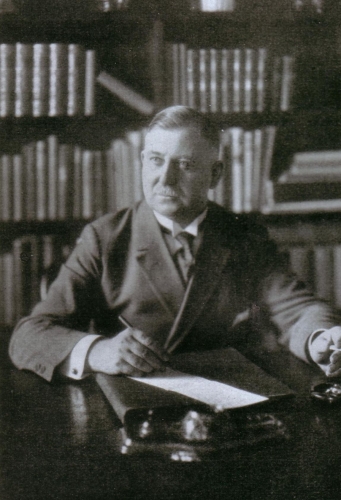

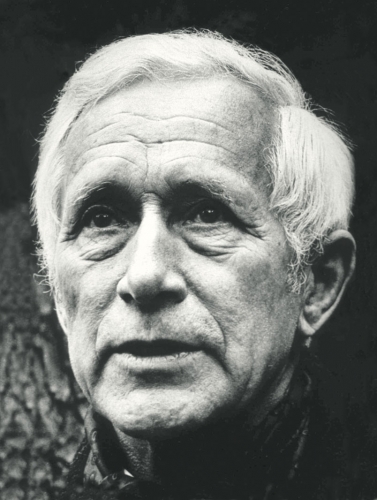

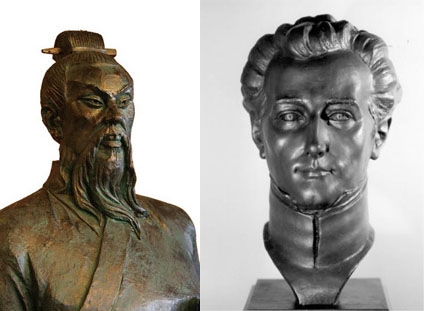
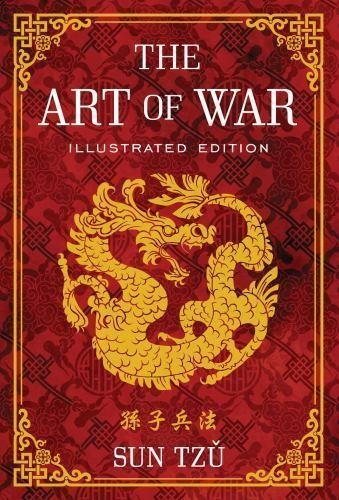 Son actualité tient à la géopolitique mondiale et à l’importance croissante du pays de Chung Kuò sur le plan économique et stratégique, mais aussi à l’exotisme de formulations littéraires du texte, inspirant une tradition de savoir dont l’ambiguïté, comme celle des écrits de Lao Tse, est susceptible d’interprétations multiples. Par ailleurs, l’actualité de L’Art de la Guerre découle de la somme des dilemmes et des interrogations que les hommes de pensée et d’action doivent résoudre dans les drames individuels de leur vie, ou dans les engagements collectifs de leurs peuples ou encore dans les questionnements imposés par des situations graves, de danger existentiel et de menace imminente.
Son actualité tient à la géopolitique mondiale et à l’importance croissante du pays de Chung Kuò sur le plan économique et stratégique, mais aussi à l’exotisme de formulations littéraires du texte, inspirant une tradition de savoir dont l’ambiguïté, comme celle des écrits de Lao Tse, est susceptible d’interprétations multiples. Par ailleurs, l’actualité de L’Art de la Guerre découle de la somme des dilemmes et des interrogations que les hommes de pensée et d’action doivent résoudre dans les drames individuels de leur vie, ou dans les engagements collectifs de leurs peuples ou encore dans les questionnements imposés par des situations graves, de danger existentiel et de menace imminente.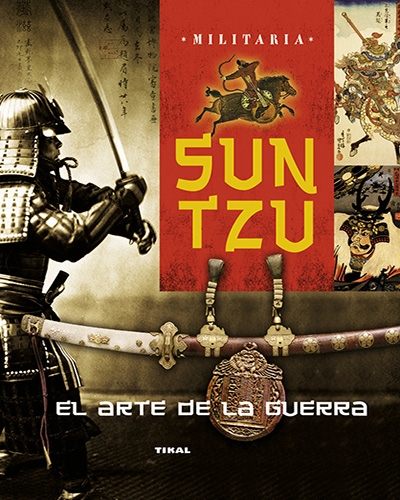
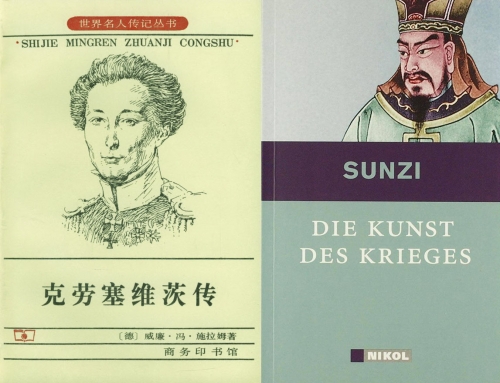
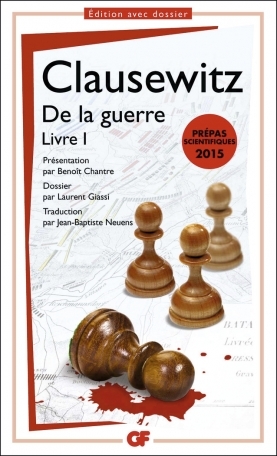 La subtilité du coup d’œil et la rapidité d’exécution décident de la réussite immédiate et à long terme. Elles fondent dans l’instant, l’esprit et l’âme de l’action du stratège. Voir, agir et vaincre le futur se dévoilent totalement dans l’instant, dans l’occasion fugace, dans la saisie d’un acte, dans un détail divinatoire. Voir, interpréter et agir exigent de passer par des manifestations infimes, par un coup de regard et une étincelle des yeux ! Il faut saisir toutes les implications d’un acte par une décision foudroyante ! Agir sur le futur, c’est acter dans les amonts du temps, c’est penser la durée dans l’instant, c’est troubler l’ordre absolu par l’irruption du chaos, c’est former par l’informe, dans toute la profondeur des temps. La victoire, dans l’ordre absolu, est le fruit de l’ordre intérieur, brisant la législation du prévisible. C’est frapper par l’imparable, portant atteinte aux vertus du paisible. C’est là que la lame scinde la lumière de ses origines et coupe le regard de l’homme pour le faire rentrer dans les ténèbres de la nuit et dans celles du vide. Dans la domestication de la guerre et des conflits permanents, quatre écoles mènent le jeu et orientent les solutions dans la Chine ancienne :
La subtilité du coup d’œil et la rapidité d’exécution décident de la réussite immédiate et à long terme. Elles fondent dans l’instant, l’esprit et l’âme de l’action du stratège. Voir, agir et vaincre le futur se dévoilent totalement dans l’instant, dans l’occasion fugace, dans la saisie d’un acte, dans un détail divinatoire. Voir, interpréter et agir exigent de passer par des manifestations infimes, par un coup de regard et une étincelle des yeux ! Il faut saisir toutes les implications d’un acte par une décision foudroyante ! Agir sur le futur, c’est acter dans les amonts du temps, c’est penser la durée dans l’instant, c’est troubler l’ordre absolu par l’irruption du chaos, c’est former par l’informe, dans toute la profondeur des temps. La victoire, dans l’ordre absolu, est le fruit de l’ordre intérieur, brisant la législation du prévisible. C’est frapper par l’imparable, portant atteinte aux vertus du paisible. C’est là que la lame scinde la lumière de ses origines et coupe le regard de l’homme pour le faire rentrer dans les ténèbres de la nuit et dans celles du vide. Dans la domestication de la guerre et des conflits permanents, quatre écoles mènent le jeu et orientent les solutions dans la Chine ancienne : Or, si la stratégie à l’occidentale suppose l’organisation des combats en fonction du but de guerre (Zweck) et l’investissement des forces dans l’espace en fonction des combats, la stratégie chinoise conçoit le fondement de la stratégie dans l’action indirecte, comme pratique intelligente de la ruse. L’intelligence rusée du chef de guerre construit sa victoire sur le mouvement de l’adversaire, dans l’esprit même de l’ennemi. Or, si tel est un objectif important de la conduite des opérations militaires, de quelle manière peut-on assimiler une opération militaire, en particulier celle du stratège à un art, à une activité de l’âme. Comment par ailleurs, peut-on construire une philosophie ou une théorie de cet art ? Or, puisque toutes les guerres réunissent trois caractères essentiels, la violence originelle, la libre activité de l’âme et l’entendement politique, comment concilier violence et politique et dans quelles conditions justifier, au nom de l’entendement politique, l’abandon du principe d’anéantissement ou de victoire, sur l’ennemi ? Et encore, là où la décision est inséparablement politique et militaire, comment justifier un abandon du combat, qui est le seul conforme à l’essence de la guerre et à son concept pur ? Si la guerre n’est pas une réalité autonome du politique (d’après Carl Clausewitz, « la guerre a bien sa grammaire, mais non sa logique propre »), quel est le sens d’une action guerrière qui s’oriente délibérément vers la manœuvre et vers l’action indirecte, tournant le dos à la bataille et au combat ? Et pour terminer, la série des questionnements inhérents au débat stratégique, comment réconcilier le caractère historique, conditionné et déterminé d’une guerre, liée à des circonstances conjoncturelles et aux intentions politiques des belligérants, aux modèles abstraits, philosophiques et anhistoriques des guerres absolues, seuls conformes au concept pur de guerre ? En son temps, Sun Tzu suggère de « construire sa victoire sur les mouvements de l’ennemi » et cette recommandation opère par le renouvellement constant de deux modalités du combat : de « front » ou de « biais ». Or, la « puissance de l’action de biais » repose sur des ruses, des surprises et des procédées indirectes qui relèvent de l’action tactique, qui ne font appel ni à l’organisation des armés sur le terrain ni à leur réunion en vue de l’engagement. Elles appartiennent aux procédés des manœuvres hétérodoxes et à la tactique plus qu’à la stratégie.
Or, si la stratégie à l’occidentale suppose l’organisation des combats en fonction du but de guerre (Zweck) et l’investissement des forces dans l’espace en fonction des combats, la stratégie chinoise conçoit le fondement de la stratégie dans l’action indirecte, comme pratique intelligente de la ruse. L’intelligence rusée du chef de guerre construit sa victoire sur le mouvement de l’adversaire, dans l’esprit même de l’ennemi. Or, si tel est un objectif important de la conduite des opérations militaires, de quelle manière peut-on assimiler une opération militaire, en particulier celle du stratège à un art, à une activité de l’âme. Comment par ailleurs, peut-on construire une philosophie ou une théorie de cet art ? Or, puisque toutes les guerres réunissent trois caractères essentiels, la violence originelle, la libre activité de l’âme et l’entendement politique, comment concilier violence et politique et dans quelles conditions justifier, au nom de l’entendement politique, l’abandon du principe d’anéantissement ou de victoire, sur l’ennemi ? Et encore, là où la décision est inséparablement politique et militaire, comment justifier un abandon du combat, qui est le seul conforme à l’essence de la guerre et à son concept pur ? Si la guerre n’est pas une réalité autonome du politique (d’après Carl Clausewitz, « la guerre a bien sa grammaire, mais non sa logique propre »), quel est le sens d’une action guerrière qui s’oriente délibérément vers la manœuvre et vers l’action indirecte, tournant le dos à la bataille et au combat ? Et pour terminer, la série des questionnements inhérents au débat stratégique, comment réconcilier le caractère historique, conditionné et déterminé d’une guerre, liée à des circonstances conjoncturelles et aux intentions politiques des belligérants, aux modèles abstraits, philosophiques et anhistoriques des guerres absolues, seuls conformes au concept pur de guerre ? En son temps, Sun Tzu suggère de « construire sa victoire sur les mouvements de l’ennemi » et cette recommandation opère par le renouvellement constant de deux modalités du combat : de « front » ou de « biais ». Or, la « puissance de l’action de biais » repose sur des ruses, des surprises et des procédées indirectes qui relèvent de l’action tactique, qui ne font appel ni à l’organisation des armés sur le terrain ni à leur réunion en vue de l’engagement. Elles appartiennent aux procédés des manœuvres hétérodoxes et à la tactique plus qu’à la stratégie.
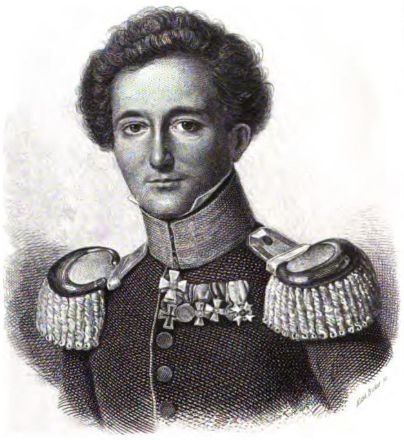
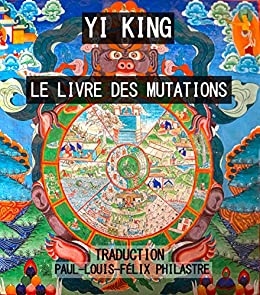 Dans la conception occidentale de la guerre est exclu tout principe de « limite » qui, dans la stratégie chinoise, trouve sa forme elliptique dans le désengagement et la « fuite ». L’expression plus fidèle de la philosophie chinoise est celle du « Livre des mutations » dont les figures divinatoires offrent une représentation symbolique de l’univers et une référence aux forces qui y sont à l’œuvre. Ces représentations de la « science des mutations », sont liées, depuis les origines, aux arts martiaux, à la dialectique du Yin et du Yang, au sein de laquelle il n’y a pas de négation, mais de simple dépassement. Grâce à l’art divinatoire, il est possible de déchiffrer et de prévoir ce qui est encore en germe, par l’identification des traces ou des signes avant-coureurs, des mutations ou des évènements qui se dessinent. L’énoncé philosophique selon lequel « l’occulte est au cœur du manifeste et non dans son contraire » est au cœur du système d’interprétation de la réalité contenu dans le « Livre des mutations ». Le réel se définit par son instabilité et ses configurations transitoires. Il faudra en déchiffrer les formes et en appréhender le sens afin d’en tirer parti.
Dans la conception occidentale de la guerre est exclu tout principe de « limite » qui, dans la stratégie chinoise, trouve sa forme elliptique dans le désengagement et la « fuite ». L’expression plus fidèle de la philosophie chinoise est celle du « Livre des mutations » dont les figures divinatoires offrent une représentation symbolique de l’univers et une référence aux forces qui y sont à l’œuvre. Ces représentations de la « science des mutations », sont liées, depuis les origines, aux arts martiaux, à la dialectique du Yin et du Yang, au sein de laquelle il n’y a pas de négation, mais de simple dépassement. Grâce à l’art divinatoire, il est possible de déchiffrer et de prévoir ce qui est encore en germe, par l’identification des traces ou des signes avant-coureurs, des mutations ou des évènements qui se dessinent. L’énoncé philosophique selon lequel « l’occulte est au cœur du manifeste et non dans son contraire » est au cœur du système d’interprétation de la réalité contenu dans le « Livre des mutations ». Le réel se définit par son instabilité et ses configurations transitoires. Il faudra en déchiffrer les formes et en appréhender le sens afin d’en tirer parti. 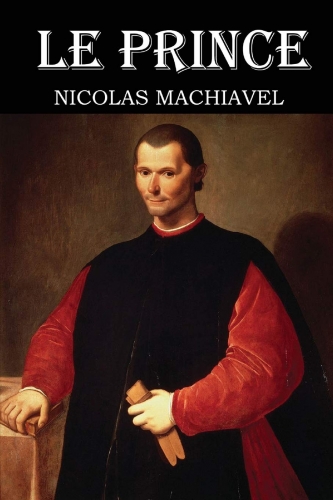
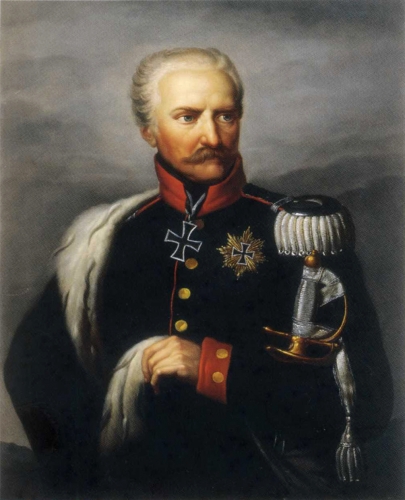
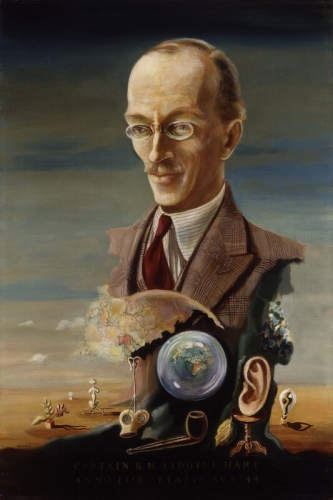
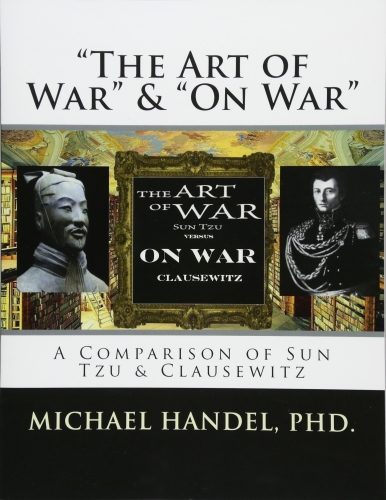
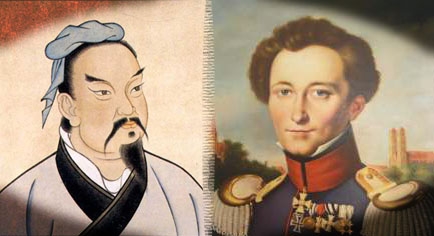
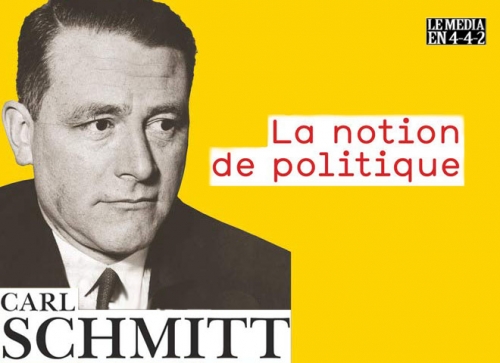



 Julien FREUND disqualifie nazisme et communisme en phases préparatoires du totalitarisme de l’utopie. Il insupporte l’intolérable. Aussi, invente-t-il une théorie englobante du vécu des peuples comme acte constitutif de la contestation du projet collectif des idéologies mondiales. Il les dénonce comme sécularisation des monothéismes.
Julien FREUND disqualifie nazisme et communisme en phases préparatoires du totalitarisme de l’utopie. Il insupporte l’intolérable. Aussi, invente-t-il une théorie englobante du vécu des peuples comme acte constitutif de la contestation du projet collectif des idéologies mondiales. Il les dénonce comme sécularisation des monothéismes. Le présupposé se signale en ce qu’il polarise son opposé. Il fixe les limites entre lesquelles oscille le réel de la vie.
Le présupposé se signale en ce qu’il polarise son opposé. Il fixe les limites entre lesquelles oscille le réel de la vie. 


![Sociologie_du_conflit___Julien_[...]Freund_Julien_bpt6k4806958w.jpg](http://euro-synergies.hautetfort.com/media/00/01/684065293.jpg) Si le 0 est mode de mise à zéro de ce qui précède, le non-lieu du désenchantement, du dépérissement, de la dépolitisation, soit non-Etre, le 1 est constellation de la monocratie, de la violence (par refus du combat), de l’asservissement. C’est le monde des échanges à somme positive : il n’y en a qu’un qui gagne.
Si le 0 est mode de mise à zéro de ce qui précède, le non-lieu du désenchantement, du dépérissement, de la dépolitisation, soit non-Etre, le 1 est constellation de la monocratie, de la violence (par refus du combat), de l’asservissement. C’est le monde des échanges à somme positive : il n’y en a qu’un qui gagne.  Le technique est donc médiation mais elle est serve en tant qu’elle est au service de la science, de la puissance, de l’esthétique, du politique, de la culture, de l’économie, etc… et leurs fins. La technique est alors la décision de ceux qui l’utilisent, la détiennent ou la précipitent dans l’antagonisme des fins. Associative ou dissociative, quelle est-elle ? Serait-elle nouveau rapport de commandement à obéissance, de maître à esclave ou de satisfaction des besoins qu’elle créerait par elle-même ? Serait-elle, au final, l’essence des essences ? Elle n’est dès lors pas neutre, ni donc le tiers attendu. Tout change avec la technologie. Celle-ci s’arroge le droit de poser ses propres fins, présupposés et moyens. Son autonomisation téléologique et sa dimension normative face au politique, à l’entreprenariat, à l’éducateur ou au militaire est gros d’une conflictualité avec les propres exigences téléologiques de ces dernières activités.
Le technique est donc médiation mais elle est serve en tant qu’elle est au service de la science, de la puissance, de l’esthétique, du politique, de la culture, de l’économie, etc… et leurs fins. La technique est alors la décision de ceux qui l’utilisent, la détiennent ou la précipitent dans l’antagonisme des fins. Associative ou dissociative, quelle est-elle ? Serait-elle nouveau rapport de commandement à obéissance, de maître à esclave ou de satisfaction des besoins qu’elle créerait par elle-même ? Serait-elle, au final, l’essence des essences ? Elle n’est dès lors pas neutre, ni donc le tiers attendu. Tout change avec la technologie. Celle-ci s’arroge le droit de poser ses propres fins, présupposés et moyens. Son autonomisation téléologique et sa dimension normative face au politique, à l’entreprenariat, à l’éducateur ou au militaire est gros d’une conflictualité avec les propres exigences téléologiques de ces dernières activités. 
 Mais surtout, Julien FREUND croise le fer avec l’entreprise de mise en dédacence-décadance. (Théorie du choc, grande inversion, levées des armées de réserve du capital depuis les extrémités de la terre) et l’entreprise de prise qui guigne le territoire, la munificence, la magnificence des Européens, en même temps qu’elle orchestre leur dépossession, dévastation, élimination. (Précisons qu’Europe a pour radical le verbe ropein qui signifie débroussailler, sarcler, plumer, piller… !).
Mais surtout, Julien FREUND croise le fer avec l’entreprise de mise en dédacence-décadance. (Théorie du choc, grande inversion, levées des armées de réserve du capital depuis les extrémités de la terre) et l’entreprise de prise qui guigne le territoire, la munificence, la magnificence des Européens, en même temps qu’elle orchestre leur dépossession, dévastation, élimination. (Précisons qu’Europe a pour radical le verbe ropein qui signifie débroussailler, sarcler, plumer, piller… !).  Une idée archaïque peut toujours reparaître sous d’autres formes ; ce que l’homme a pensé, il peut à nouveau le penser ; ce qu’un peuple a fait il peut à nouveau le faire. La décadence appelle à la renaissance. Le destin est dans l’origine.
Une idée archaïque peut toujours reparaître sous d’autres formes ; ce que l’homme a pensé, il peut à nouveau le penser ; ce qu’un peuple a fait il peut à nouveau le faire. La décadence appelle à la renaissance. Le destin est dans l’origine. 
 Julien FREUND a en stock 10 catégories d’objections-obstacles à ces menées :
Julien FREUND a en stock 10 catégories d’objections-obstacles à ces menées :  D’aucuns voudraient-ils commuter la condition humaine en condition juridique vers le zoologique ou la chosification, Julien FREUND moqueur tragique de leur objecter que toute entreprise demeure soumise au paradoxe des conséquences et que tout plan collectif peut entrer en décadence jusqu’à s’effondrer. Ainsi entendue décadence n’est autre chose que la sociologisation de la chute de la modernité, l’agonie de l’aire actiaque, donc la clôture du temps de l’historiette du désert.
D’aucuns voudraient-ils commuter la condition humaine en condition juridique vers le zoologique ou la chosification, Julien FREUND moqueur tragique de leur objecter que toute entreprise demeure soumise au paradoxe des conséquences et que tout plan collectif peut entrer en décadence jusqu’à s’effondrer. Ainsi entendue décadence n’est autre chose que la sociologisation de la chute de la modernité, l’agonie de l’aire actiaque, donc la clôture du temps de l’historiette du désert. 

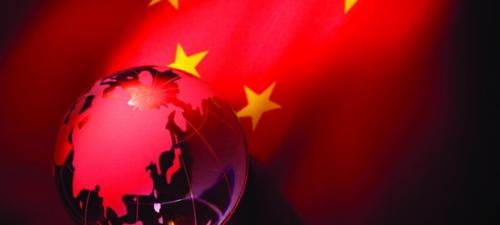

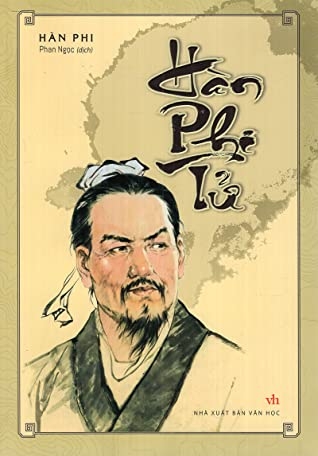 Par ailleurs, le contexte chinois est celui d'une culture dans laquelle l'école légaliste a agi en profondeur. Courant philosophique fondé au IIIe siècle avant J.-C. par Han Fei qui, en opposition aux idées confucéennes de bienveillance, de vertu et de respect des rituels, prêchait le droit du prince à exercer un pouvoir absolu et incontesté. Seule source du droit, le prince légaliste ne délègue aucune autorité à qui que ce soit. A côté de lui, il n'y a que des exécuteurs testamentaires, aux tâches strictement délimitées. En-dessous d'eux se trouvent les sujets, obligés seulement d'obéir.
Par ailleurs, le contexte chinois est celui d'une culture dans laquelle l'école légaliste a agi en profondeur. Courant philosophique fondé au IIIe siècle avant J.-C. par Han Fei qui, en opposition aux idées confucéennes de bienveillance, de vertu et de respect des rituels, prêchait le droit du prince à exercer un pouvoir absolu et incontesté. Seule source du droit, le prince légaliste ne délègue aucune autorité à qui que ce soit. A côté de lui, il n'y a que des exécuteurs testamentaires, aux tâches strictement délimitées. En-dessous d'eux se trouvent les sujets, obligés seulement d'obéir.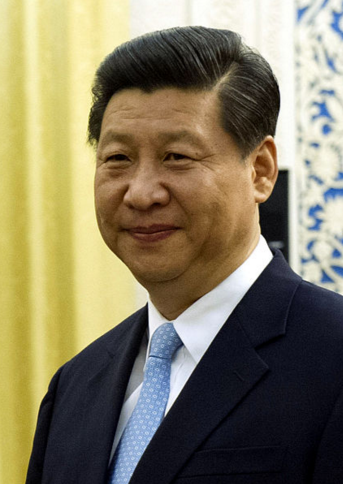 Xi Jinping a redéfini le centre de gravité idéologique du parti communiste, redéfini la tolérance limitée de la dissidence, laquelle pouvait parfois se manifester mais a désormais disparu, de même toute forme d'autonomie, qui aurait pu être accordée au Xinjiang, à la Mongolie intérieure et à Hong Kong, a été supprimée.
Xi Jinping a redéfini le centre de gravité idéologique du parti communiste, redéfini la tolérance limitée de la dissidence, laquelle pouvait parfois se manifester mais a désormais disparu, de même toute forme d'autonomie, qui aurait pu être accordée au Xinjiang, à la Mongolie intérieure et à Hong Kong, a été supprimée.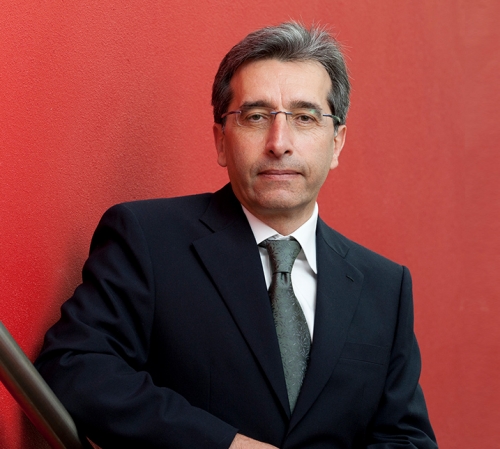
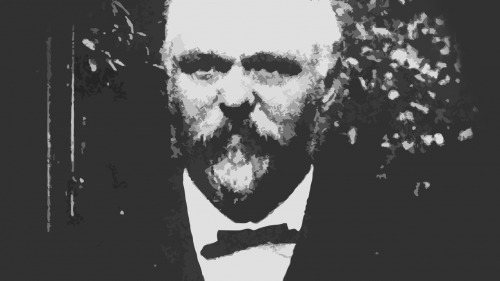
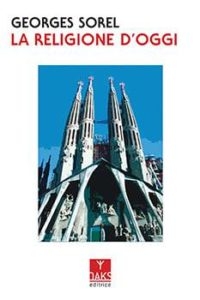 Parmi ces intellectuels figure Georges Sorel, dont un ouvrage a été récemment réédité, l'un des moins connus de ses lecteurs. Nous nous référons à La religione d'oggi, qui est parue en librairie grâce aux éditions OAKS (pour les commandes : info@oakseditrice.it, p. 126, 16 euros).
Parmi ces intellectuels figure Georges Sorel, dont un ouvrage a été récemment réédité, l'un des moins connus de ses lecteurs. Nous nous référons à La religione d'oggi, qui est parue en librairie grâce aux éditions OAKS (pour les commandes : info@oakseditrice.it, p. 126, 16 euros).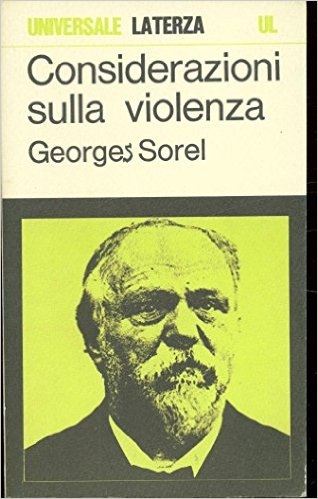 Le problème posé par Marx n'est pas, sic et simpliciter, économique, mais moral. Dans le travail en usine, l'ouvrier s'aliène sa propre condition d'être de raison. Kant, se référant dans la Raison pratique à la dignité de l'homme, n'avait fait que synthétiser les préceptes qui avaient initialement émergé de la bonne nouvelle chrétienne : "Derrière le concept d'aliénation [...] il y a la notion d'être humain développée par la philosophie moderne [...] à partir de la notion chrétienne d'égale dignité humaine" (p. XI). Quelle est la voie à suivre, selon Marx et Sorel, pour parvenir à la désaliénation ? La Révolution. Seul l'acte révolutionnaire humaniserait les circonstances historico-économiques dans lesquelles, en fait, l'homme vit concrètement. Le "soupir religieux" de la créature opprimée se transformerait ainsi en une lutte socio-politique : en elle, l'exigence éthique reste primordiale. Pour accéder aux thèses de Sorel dans le domaine religieux, il ne suffit pas de se référer au marxisme. En effet, à partir de la fin du XIXe siècle, les certitudes gnoséologiques du positivisme et du néo-positivisme ont progressivement disparu. Sorel soutient, dans le livre que nous présentons, les thèses probabilistes de Boutroux, selon lesquelles dans la sphère scientifique, il fallait toujours passer du dogmatisme positiviste au raisonnement suivant : « passer du nécessaire au probable, passer des mathématiques de la certitude aux mathématiques de l'incertitude" (p. XIV).
Le problème posé par Marx n'est pas, sic et simpliciter, économique, mais moral. Dans le travail en usine, l'ouvrier s'aliène sa propre condition d'être de raison. Kant, se référant dans la Raison pratique à la dignité de l'homme, n'avait fait que synthétiser les préceptes qui avaient initialement émergé de la bonne nouvelle chrétienne : "Derrière le concept d'aliénation [...] il y a la notion d'être humain développée par la philosophie moderne [...] à partir de la notion chrétienne d'égale dignité humaine" (p. XI). Quelle est la voie à suivre, selon Marx et Sorel, pour parvenir à la désaliénation ? La Révolution. Seul l'acte révolutionnaire humaniserait les circonstances historico-économiques dans lesquelles, en fait, l'homme vit concrètement. Le "soupir religieux" de la créature opprimée se transformerait ainsi en une lutte socio-politique : en elle, l'exigence éthique reste primordiale. Pour accéder aux thèses de Sorel dans le domaine religieux, il ne suffit pas de se référer au marxisme. En effet, à partir de la fin du XIXe siècle, les certitudes gnoséologiques du positivisme et du néo-positivisme ont progressivement disparu. Sorel soutient, dans le livre que nous présentons, les thèses probabilistes de Boutroux, selon lesquelles dans la sphère scientifique, il fallait toujours passer du dogmatisme positiviste au raisonnement suivant : « passer du nécessaire au probable, passer des mathématiques de la certitude aux mathématiques de l'incertitude" (p. XIV).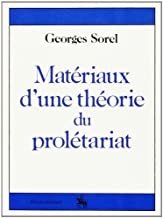 Pour Sorel, la ligne moderniste en France était née dans le sillage des thèses d'Ernest Renan et du philosophe Eduard Hartmann. Les deux penseurs estimaient que l'affaiblissement dogmatique de la foi conduirait à l'émergence d'une religiosité intérieure plus authentique. Il s'agirait de vivre véritablement l'expérience religieuse, d'en témoigner concrètement dans les actes de la vie. Cela aurait déterminé la réduction du nombre de fidèles, qui se seraient toutefois transformés en authentiques croyants. Sorel, qui proposait aux masses le mythe de la grève générale, a montré, même si c'était avec une certaine ambiguïté, un intérêt sincère pour cette possible religion du futur. À notre avis, il était naïf, les instances modernistes au sein de l'Église, ainsi que dans la société, se sont avérées, en réalité, fonctionnelles au plein déploiement de la Forme-Capital, qui est devenue définitivement mondiale, des décennies plus tard, dans la mythique « révolution » de Soixante-Huit. Puis le Père, symbole de la Loi et de la Tradition, a été assassiné. De son sang est né le royaume de la marchandise absolue, dans lequel nous vivons encore.
Pour Sorel, la ligne moderniste en France était née dans le sillage des thèses d'Ernest Renan et du philosophe Eduard Hartmann. Les deux penseurs estimaient que l'affaiblissement dogmatique de la foi conduirait à l'émergence d'une religiosité intérieure plus authentique. Il s'agirait de vivre véritablement l'expérience religieuse, d'en témoigner concrètement dans les actes de la vie. Cela aurait déterminé la réduction du nombre de fidèles, qui se seraient toutefois transformés en authentiques croyants. Sorel, qui proposait aux masses le mythe de la grève générale, a montré, même si c'était avec une certaine ambiguïté, un intérêt sincère pour cette possible religion du futur. À notre avis, il était naïf, les instances modernistes au sein de l'Église, ainsi que dans la société, se sont avérées, en réalité, fonctionnelles au plein déploiement de la Forme-Capital, qui est devenue définitivement mondiale, des décennies plus tard, dans la mythique « révolution » de Soixante-Huit. Puis le Père, symbole de la Loi et de la Tradition, a été assassiné. De son sang est né le royaume de la marchandise absolue, dans lequel nous vivons encore.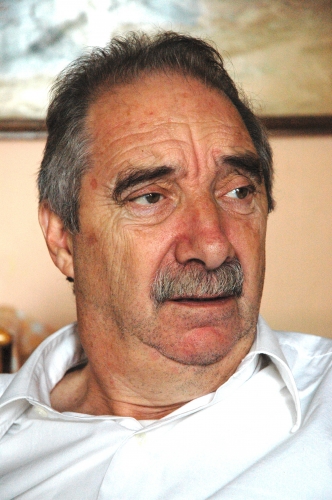

 L'État moderne qui est né dans le cadre de l'économie capitaliste libérale s'est soumis à la loi aveugle de l'offre et de la demande comme seul critère de justice, mais ses contradictions et les demandes du peuple, surtout à partir du milieu du XIXe siècle, ont produit un changement qui s'est réalisé à partir de la troisième décennie du XXe siècle.
L'État moderne qui est né dans le cadre de l'économie capitaliste libérale s'est soumis à la loi aveugle de l'offre et de la demande comme seul critère de justice, mais ses contradictions et les demandes du peuple, surtout à partir du milieu du XIXe siècle, ont produit un changement qui s'est réalisé à partir de la troisième décennie du XXe siècle.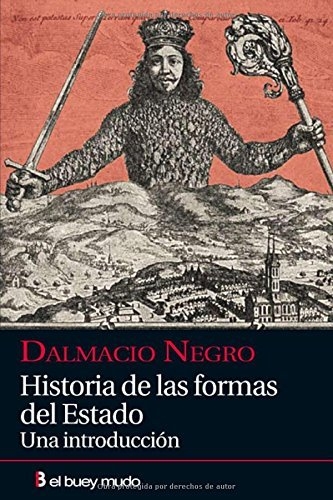
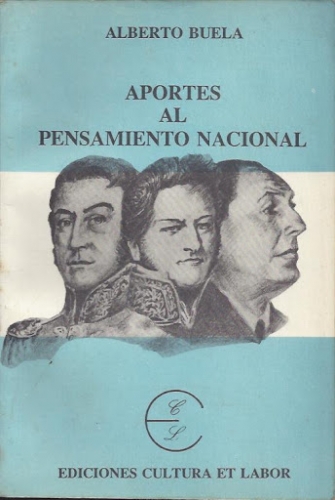
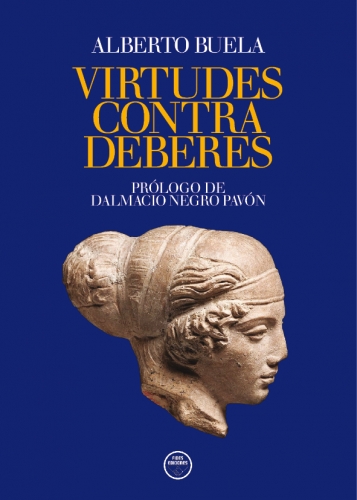

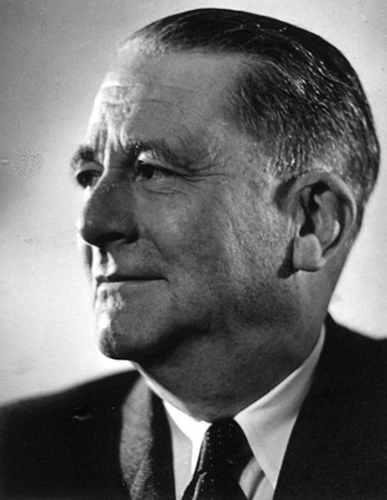
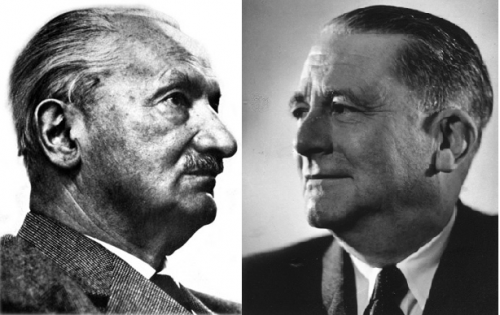
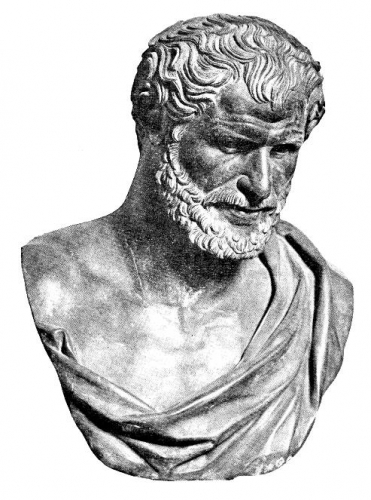 Dans le contexte islamique, puisque la révélation y est à la fois prophétie et loi, le sens réel du terme conflit utilisé par Héraclite apparaît avec toute sa force perturbatrice dans le concept théologique de djihad. Cela, rappelons-le, signifie littéralement "effort" et indique l'engagement de l'homme à s'améliorer, à devenir un "vrai" être humain, paraphrasant l'interprétation qu'en donne l'imam Khomeiny [2].
Dans le contexte islamique, puisque la révélation y est à la fois prophétie et loi, le sens réel du terme conflit utilisé par Héraclite apparaît avec toute sa force perturbatrice dans le concept théologique de djihad. Cela, rappelons-le, signifie littéralement "effort" et indique l'engagement de l'homme à s'améliorer, à devenir un "vrai" être humain, paraphrasant l'interprétation qu'en donne l'imam Khomeiny [2].
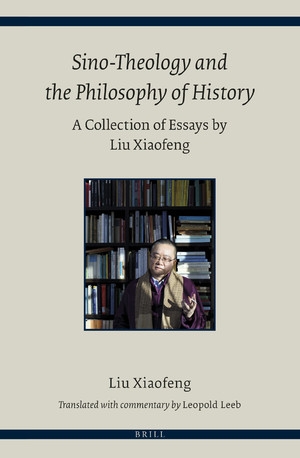 Dans ce contexte, selon l'historien et homme politique Liang Qichao, qui a vécu au tournant des XIXe et XXe siècles à l'époque du déclin inexorable et de la partition impérialiste de l'espace chinois, la solution ne pouvait être que la création d'une forme de nationalisme chinois. Cependant, ce que Qichao considérait comme du nationalisme était une forme de conscience politique et culturelle nationale, mais pas du nationalisme au sens européen du terme. En fait, ce concept est resté complètement étranger à la forme impériale traditionnelle qui, même aujourd'hui, dans son expression modernisée et influencée par le marxisme-léninisme, ressemble davantage au modèle achéménide qu'à l'idée européenne de l'État-nation et de ses impulsions impérialistes. Et, en tant que telle, elle s'est imposée dès son origine comme un dépassement en nuance de cette idée.
Dans ce contexte, selon l'historien et homme politique Liang Qichao, qui a vécu au tournant des XIXe et XXe siècles à l'époque du déclin inexorable et de la partition impérialiste de l'espace chinois, la solution ne pouvait être que la création d'une forme de nationalisme chinois. Cependant, ce que Qichao considérait comme du nationalisme était une forme de conscience politique et culturelle nationale, mais pas du nationalisme au sens européen du terme. En fait, ce concept est resté complètement étranger à la forme impériale traditionnelle qui, même aujourd'hui, dans son expression modernisée et influencée par le marxisme-léninisme, ressemble davantage au modèle achéménide qu'à l'idée européenne de l'État-nation et de ses impulsions impérialistes. Et, en tant que telle, elle s'est imposée dès son origine comme un dépassement en nuance de cette idée.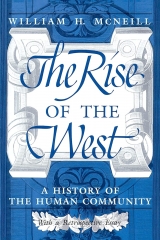 Ainsi, l'histoire mondiale n'a été que la superstructure historiographique du libéralisme occidental à l'époque de la guerre froide et de l'instant unipolaire.
Ainsi, l'histoire mondiale n'a été que la superstructure historiographique du libéralisme occidental à l'époque de la guerre froide et de l'instant unipolaire.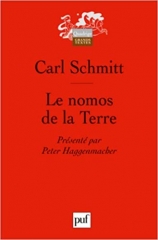 Les États-Unis sont nés dans un "espace libre" où prévalait la loi du plus fort, celle de l'état de nature et sur le fond idéologico-religieux du thème biblique de l'Exode et de la conviction messianique de la construction du "Nouvel Israël" et de la "Jérusalem sur terre" : des principes qui sont à la base de l'idée puritaine de supériorité morale et de prédestination et qui représentent les fondements existentiels de l'américanisme. Les États-Unis sont nés en totale opposition au modèle européen. Leur entrée sur le Vieux Continent marque le passage de la guerre "légale" à la guerre "idéologique" : l'ennemi doit non seulement être vaincu, mais diabolisé, criminalisé et donc anéanti. Ce que les États-Unis ont fait, c'est ramener en Europe la loi du plus fort, en la considérant, comme les Européens l'avaient fait avec l'hémisphère occidental à l'époque moderne, comme un "espace libre" à soumettre à la simple conquête.
Les États-Unis sont nés dans un "espace libre" où prévalait la loi du plus fort, celle de l'état de nature et sur le fond idéologico-religieux du thème biblique de l'Exode et de la conviction messianique de la construction du "Nouvel Israël" et de la "Jérusalem sur terre" : des principes qui sont à la base de l'idée puritaine de supériorité morale et de prédestination et qui représentent les fondements existentiels de l'américanisme. Les États-Unis sont nés en totale opposition au modèle européen. Leur entrée sur le Vieux Continent marque le passage de la guerre "légale" à la guerre "idéologique" : l'ennemi doit non seulement être vaincu, mais diabolisé, criminalisé et donc anéanti. Ce que les États-Unis ont fait, c'est ramener en Europe la loi du plus fort, en la considérant, comme les Européens l'avaient fait avec l'hémisphère occidental à l'époque moderne, comme un "espace libre" à soumettre à la simple conquête.

 NOTES
NOTES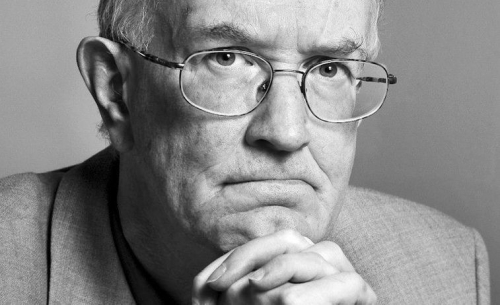
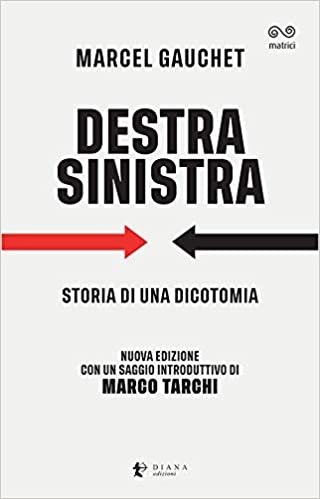 La maison d'édition Diana propose la réimpression d'un essai de Marcel Gauchet "Droite/Gauche - histoire d'une dichotomie", enrichi d'une introduction de Marco Tarchi et d'une postface de l'auteur, annexe nécessaire à une publication datant déjà de 1992.
La maison d'édition Diana propose la réimpression d'un essai de Marcel Gauchet "Droite/Gauche - histoire d'une dichotomie", enrichi d'une introduction de Marco Tarchi et d'une postface de l'auteur, annexe nécessaire à une publication datant déjà de 1992.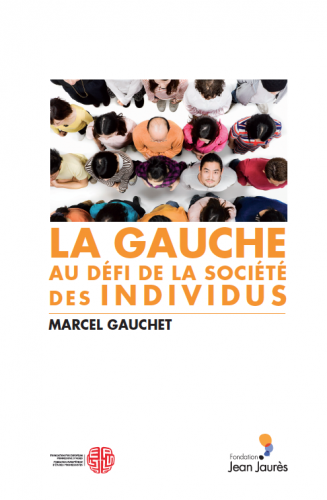 Les finalités, les contenus et les programmes changent mais l'"ordre de bataille" de la politique française reste formellement inchangé : dans un mélange de conflit et de fragmentation, les modérés et les alternances du centre continuent à gouverner, laissant "libre cours" aux doctrinaires des extrêmes et à un dualisme aussi élémentaire que manichéen, virulent et implacable.
Les finalités, les contenus et les programmes changent mais l'"ordre de bataille" de la politique française reste formellement inchangé : dans un mélange de conflit et de fragmentation, les modérés et les alternances du centre continuent à gouverner, laissant "libre cours" aux doctrinaires des extrêmes et à un dualisme aussi élémentaire que manichéen, virulent et implacable.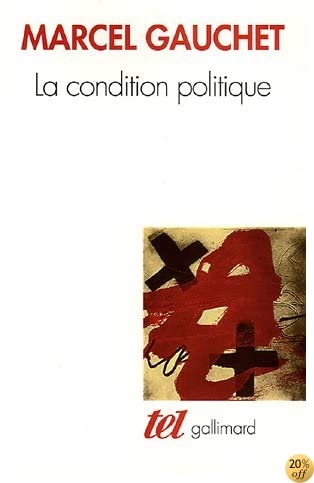 Cette approche contraste avec celle "essentialiste" (identifiable, en grande partie, dans les écrits de Norberto Bobbio), qui échappe au test empirique d'une discrimination claire entre les deux catégories et n'explique pas les transformations que le passage du temps et l'évolution des circonstances ont imposées aux pratiques des partis et mouvements politiques traditionnellement placés dans l'un ou l'autre domaine.
Cette approche contraste avec celle "essentialiste" (identifiable, en grande partie, dans les écrits de Norberto Bobbio), qui échappe au test empirique d'une discrimination claire entre les deux catégories et n'explique pas les transformations que le passage du temps et l'évolution des circonstances ont imposées aux pratiques des partis et mouvements politiques traditionnellement placés dans l'un ou l'autre domaine.
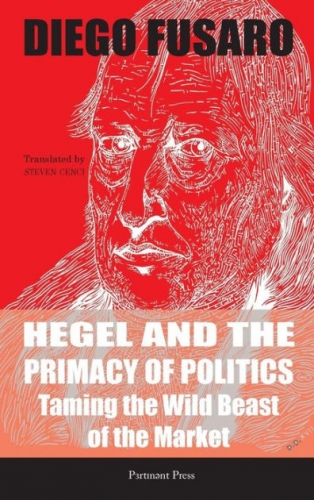 Bien sûr, la question de l'antifascisme est absolument décisive. Je voudrais résumer la question comme suit : à l'époque de Gramsci ou de Gobetti, en nous limitant au contexte italien, l'antifascisme était indispensable et fondamental, et il avait, du moins chez Gramsci, un but politique communiste, patriotique et anticapitaliste. Le problème, cependant, se pose lorsque l'antifascisme continue à se développer en l'absence de fascisme ou, plus précisément, lorsque le fascisme, si par cette expression nous entendons le pouvoir de manière générique, change de visage.
Bien sûr, la question de l'antifascisme est absolument décisive. Je voudrais résumer la question comme suit : à l'époque de Gramsci ou de Gobetti, en nous limitant au contexte italien, l'antifascisme était indispensable et fondamental, et il avait, du moins chez Gramsci, un but politique communiste, patriotique et anticapitaliste. Le problème, cependant, se pose lorsque l'antifascisme continue à se développer en l'absence de fascisme ou, plus précisément, lorsque le fascisme, si par cette expression nous entendons le pouvoir de manière générique, change de visage.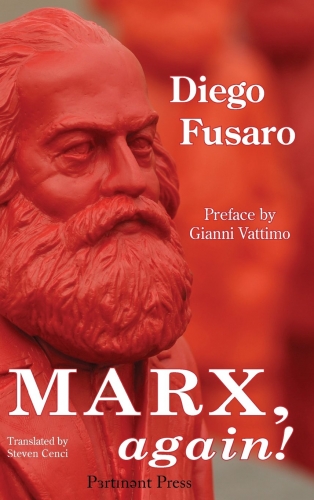 Par conséquent, la gauche, qui ne défend plus les idées de Gramsci et de Marx, mais qui défend directement le capital, du moins la plus grande partie de celui-ci, a besoin de maintenir l'antifascisme en vie pour se légitimer, afin que la contradiction ne soit pas visible et évidente ; c'est-à-dire que cette gauche veut dissimuler le fait pourtant patent que la gauche est restée antifasciste, alors que le fascisme n'existe plus mais n'est pas pour autant anticapitaliste, alors que le capitalisme progresse plus que jamais. Au contraire, les hommes de gauche utilisent l'antifascisme comme prétexte pour adhérer complètement au "fascisme" de la civilisation consumériste, à l'atout invisible de l'économie de marché. Je pense au cas français où la gauche forme un front antifasciste uni contre Le Pen pour accepter pleinement le "fascisme de marché" et l'élite financière cooptée par Rothschild, représentée par le libéral Macron.
Par conséquent, la gauche, qui ne défend plus les idées de Gramsci et de Marx, mais qui défend directement le capital, du moins la plus grande partie de celui-ci, a besoin de maintenir l'antifascisme en vie pour se légitimer, afin que la contradiction ne soit pas visible et évidente ; c'est-à-dire que cette gauche veut dissimuler le fait pourtant patent que la gauche est restée antifasciste, alors que le fascisme n'existe plus mais n'est pas pour autant anticapitaliste, alors que le capitalisme progresse plus que jamais. Au contraire, les hommes de gauche utilisent l'antifascisme comme prétexte pour adhérer complètement au "fascisme" de la civilisation consumériste, à l'atout invisible de l'économie de marché. Je pense au cas français où la gauche forme un front antifasciste uni contre Le Pen pour accepter pleinement le "fascisme de marché" et l'élite financière cooptée par Rothschild, représentée par le libéral Macron. Il n'y a pas d'autre réalité, dans la modernité, pour les droits sociaux et les démocraties en dehors des États souverains nationaux. C'est pourquoi l'expression de Che Guevara "la patrie ou la mort" a sa propre validité aujourd'hui encore, non seulement parce qu'elle revendique l'identité contre l'anonymat impersonnel des marchés, mais aussi parce qu'elle revendique l'idée de souveraineté nationale contre les processus de déracinement voulus par le capitalisme mondialiste. La classe dominante est de gauche en matière de coutumes et de culture parce qu'elle n'a pas fait sien l'impératif de la gauche anticapitaliste de Gramsci ou de Lénine, qu'elle a d'ailleurs répudié, mais a adopté celui de la gauche rose de 1968, qui identifie le communisme à la libéralisation individualiste de la consommation et des coutumes ; c'est-à-dire à la société de libre-service des consommateurs individuels qui ont toute la liberté qu'ils peuvent concrètement acheter et se sentir libres comme des atomes de Nietzsche, comme des surhommes avec une volonté de pouvoir illimitée, c'est-à-dire qu'ils conçoivent la liberté comme la propriété de l'individu déraciné par rapport aux communautés sédentaires qu’ils posent comme autoritaires : la communauté familiale, la communauté politique, la communauté religieuse.
Il n'y a pas d'autre réalité, dans la modernité, pour les droits sociaux et les démocraties en dehors des États souverains nationaux. C'est pourquoi l'expression de Che Guevara "la patrie ou la mort" a sa propre validité aujourd'hui encore, non seulement parce qu'elle revendique l'identité contre l'anonymat impersonnel des marchés, mais aussi parce qu'elle revendique l'idée de souveraineté nationale contre les processus de déracinement voulus par le capitalisme mondialiste. La classe dominante est de gauche en matière de coutumes et de culture parce qu'elle n'a pas fait sien l'impératif de la gauche anticapitaliste de Gramsci ou de Lénine, qu'elle a d'ailleurs répudié, mais a adopté celui de la gauche rose de 1968, qui identifie le communisme à la libéralisation individualiste de la consommation et des coutumes ; c'est-à-dire à la société de libre-service des consommateurs individuels qui ont toute la liberté qu'ils peuvent concrètement acheter et se sentir libres comme des atomes de Nietzsche, comme des surhommes avec une volonté de pouvoir illimitée, c'est-à-dire qu'ils conçoivent la liberté comme la propriété de l'individu déraciné par rapport aux communautés sédentaires qu’ils posent comme autoritaires : la communauté familiale, la communauté politique, la communauté religieuse.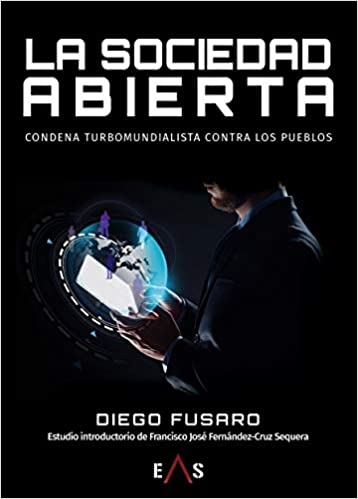 Une économie sans politique et sans État ne sera jamais démocratique ou socialiste, elle sera toujours l'humus idéal pour le capital cosmopolite, qui est tout sauf socialiste et démocratique. D'où l'importance de ce que j'appelle le souverainisme internationaliste et populiste. Souveraineté parce que la souveraineté nationale est pleinement récupérée comme base des droits et des démocraties, du socialisme et des conquêtes sociales. Internationaliste parce que ce n'est pas le nationalisme de la droite réactionnaire, xénophobe et autoritaire, c'est une souveraineté internationaliste ouverte aux autres nations socialistes et démocratiques, elle crée un internationalisme prolétarien, comme on l'appelait autrefois, qui est à l'opposé du nationalisme individualiste et réactionnaire et du cosmopolitisme libéral auxquels la gauche rose a vendu sa tête et son cœur, comme je l'ai dit précédemment.
Une économie sans politique et sans État ne sera jamais démocratique ou socialiste, elle sera toujours l'humus idéal pour le capital cosmopolite, qui est tout sauf socialiste et démocratique. D'où l'importance de ce que j'appelle le souverainisme internationaliste et populiste. Souveraineté parce que la souveraineté nationale est pleinement récupérée comme base des droits et des démocraties, du socialisme et des conquêtes sociales. Internationaliste parce que ce n'est pas le nationalisme de la droite réactionnaire, xénophobe et autoritaire, c'est une souveraineté internationaliste ouverte aux autres nations socialistes et démocratiques, elle crée un internationalisme prolétarien, comme on l'appelait autrefois, qui est à l'opposé du nationalisme individualiste et réactionnaire et du cosmopolitisme libéral auxquels la gauche rose a vendu sa tête et son cœur, comme je l'ai dit précédemment.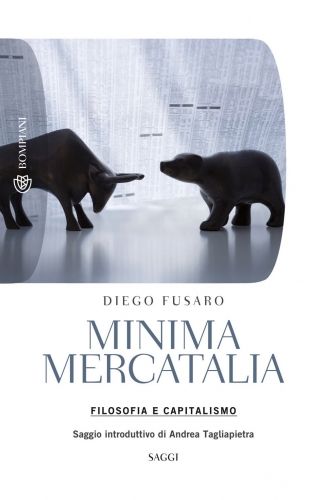 Par conséquent, quiconque s'oppose à cette vision, revendiquant la primauté de l'humain et du politique, défendant la nécessité de réguler, réclamant la primauté du politique et de la démocratie sur les flux de capitaux, de personnes, de désirs, de consommation, est automatiquement calomnié comme fasciste par la gauche rose-fuchsia, pour qui tout ce qui ne se met pas au diapason avec le seigneur cosmopolite, dont ils sont les idiots utiles, est fasciste. Le paradoxe est le suivant, je le résume ainsi, cette gauche diffame tout ce qui s'oppose à l'ordre de la classe dominante sans-frontiériste, de la classe globocratique du capital, elle diffame comme fasciste l'idée de l'intervention de l'État dans l'économie, elle diffame comme fasciste le réveil des classes dominées, des opprimés qui, comme le disait Fichte, sont au-dessus de toute autorité qui prétend être supérieure.
Par conséquent, quiconque s'oppose à cette vision, revendiquant la primauté de l'humain et du politique, défendant la nécessité de réguler, réclamant la primauté du politique et de la démocratie sur les flux de capitaux, de personnes, de désirs, de consommation, est automatiquement calomnié comme fasciste par la gauche rose-fuchsia, pour qui tout ce qui ne se met pas au diapason avec le seigneur cosmopolite, dont ils sont les idiots utiles, est fasciste. Le paradoxe est le suivant, je le résume ainsi, cette gauche diffame tout ce qui s'oppose à l'ordre de la classe dominante sans-frontiériste, de la classe globocratique du capital, elle diffame comme fasciste l'idée de l'intervention de l'État dans l'économie, elle diffame comme fasciste le réveil des classes dominées, des opprimés qui, comme le disait Fichte, sont au-dessus de toute autorité qui prétend être supérieure.
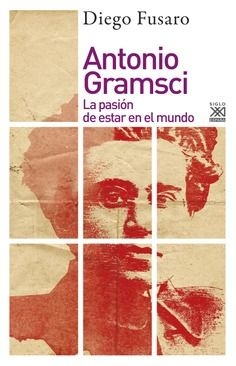 Si Gramsci était "le Marx italien", Diego Fusaro est peut-être l'actuel Gramsci. Les trois philosophes que je mentionne partagent une base philosophique commune, la dialectique hégélienne, et, même à un niveau plus général, sont les avatars de l'idéalisme allemand classique. De cet idéalisme, que Gramsci appelle "philosophie de la praxis", découle la non-conformité la plus radicale de Fusaro. Les trois auteurs sont clairement des non-conformistes. La non-conformité est une attitude qui transcende les catégories politiques vulgaires habituelles (gauche/droite, conservateur/progressiste, société ouverte/société fermée). La non-conformité est l’attitude d'un sujet collectif qui vit immergé dans une ontologie sociale. S'il n'y a pas d'analyse et de compréhension de cette ontologie sociale, la non-conformité n'est rien d'autre qu'un "état d'esprit", une pose, une rhétorique. Mais si cette attitude est ancrée dans l'analyse et la compréhension de la totalité sociale (de son ontologie), alors être contre "le fatal" devient une force révolutionnaire. Diego Fusaro est un bon connaisseur de Gramsci et a dédié un bel ouvrage documenté au "Marx italien", sur lequel nous avons déjà écrit quelques lignes : Antonio Gramsci. La pasión de estar en el mundo [XXIe siècle, Madrid, 2018 ; traduction de Michela Ferrante Lavín, à paraître dans El Inactual https://www.elinactual.com/].
Si Gramsci était "le Marx italien", Diego Fusaro est peut-être l'actuel Gramsci. Les trois philosophes que je mentionne partagent une base philosophique commune, la dialectique hégélienne, et, même à un niveau plus général, sont les avatars de l'idéalisme allemand classique. De cet idéalisme, que Gramsci appelle "philosophie de la praxis", découle la non-conformité la plus radicale de Fusaro. Les trois auteurs sont clairement des non-conformistes. La non-conformité est une attitude qui transcende les catégories politiques vulgaires habituelles (gauche/droite, conservateur/progressiste, société ouverte/société fermée). La non-conformité est l’attitude d'un sujet collectif qui vit immergé dans une ontologie sociale. S'il n'y a pas d'analyse et de compréhension de cette ontologie sociale, la non-conformité n'est rien d'autre qu'un "état d'esprit", une pose, une rhétorique. Mais si cette attitude est ancrée dans l'analyse et la compréhension de la totalité sociale (de son ontologie), alors être contre "le fatal" devient une force révolutionnaire. Diego Fusaro est un bon connaisseur de Gramsci et a dédié un bel ouvrage documenté au "Marx italien", sur lequel nous avons déjà écrit quelques lignes : Antonio Gramsci. La pasión de estar en el mundo [XXIe siècle, Madrid, 2018 ; traduction de Michela Ferrante Lavín, à paraître dans El Inactual https://www.elinactual.com/].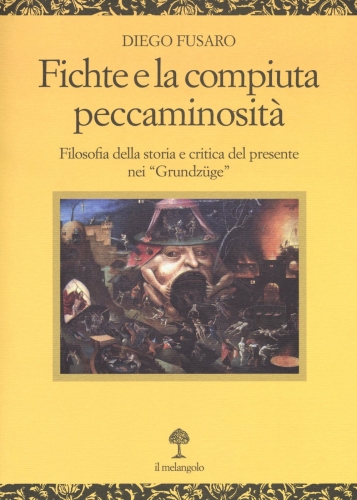 La droite ou la gauche, le bleu, le rouge ou le violet, sont tous identiques. Ce sont les couleurs des partis qui n'aspirent qu'à vivre de la partitocratie. Ils traient l'État, qui traie en réalité les classes productives : de l'ouvrier au paysan, en passant par l'indépendant et le propriétaire d'une PME. Tous ces secteurs de la population sont vampirisés par des groupes de marchands de pacotilles et d’inutilités, dont le seul lien essentiel avec la réalité consiste à être des entités ultra-subventionnées par un État qui cesse d'être un "État providence" et devient progressivement un "État extracteur de ressources" pour le maintien de la partitocratie et le maintien du capitalisme financier mondialiste.
La droite ou la gauche, le bleu, le rouge ou le violet, sont tous identiques. Ce sont les couleurs des partis qui n'aspirent qu'à vivre de la partitocratie. Ils traient l'État, qui traie en réalité les classes productives : de l'ouvrier au paysan, en passant par l'indépendant et le propriétaire d'une PME. Tous ces secteurs de la population sont vampirisés par des groupes de marchands de pacotilles et d’inutilités, dont le seul lien essentiel avec la réalité consiste à être des entités ultra-subventionnées par un État qui cesse d'être un "État providence" et devient progressivement un "État extracteur de ressources" pour le maintien de la partitocratie et le maintien du capitalisme financier mondialiste.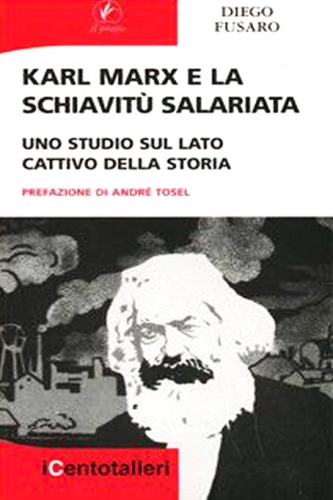 "La rhétorique évoquant une réalité qui ne peut être changée, rhétorique qui triomphe aujourd'hui, finit par quitter et accepter le monde tel qu'il est. Comme Gramsci le savait bien, c'est notre indifférence qui transforme l'ordre des choses en fatalisme. Plus nous pensons qu'une situation historique est stable et irréversible, plus elle le devient vraiment. Le fanatisme économique est une tendance irrésistible si nous n'y résistons pas, une force incontrôlable si nous ne l’infirmons pas, et un processus irréversible si nous ne le transformons pas" (p. 162).
"La rhétorique évoquant une réalité qui ne peut être changée, rhétorique qui triomphe aujourd'hui, finit par quitter et accepter le monde tel qu'il est. Comme Gramsci le savait bien, c'est notre indifférence qui transforme l'ordre des choses en fatalisme. Plus nous pensons qu'une situation historique est stable et irréversible, plus elle le devient vraiment. Le fanatisme économique est une tendance irrésistible si nous n'y résistons pas, une force incontrôlable si nous ne l’infirmons pas, et un processus irréversible si nous ne le transformons pas" (p. 162).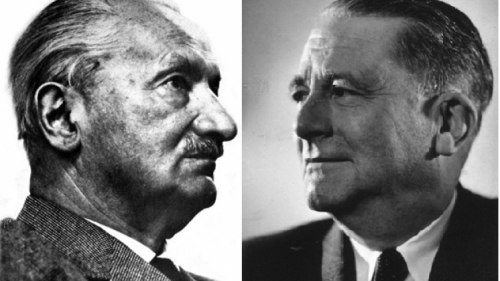
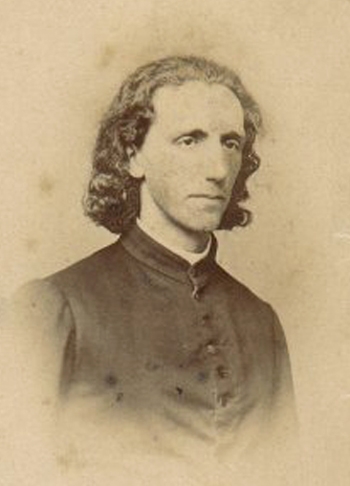 Selon lui, la philosophie, pendant plus de 2000 ans d'histoire, a prêté attention à tout ce qui a les caractéristiques de l'"être" dans ce monde, y compris le monde lui-même, mais a oublié ce que cela signifie. C'est la "question de vie" de Heidegger, qui traverse toutes ses œuvres comme un fil rouge. Une des sources qui a influencé son interprétation de ce thème a été les travaux de Franz Brentano (photo) sur l'utilisation des différents concepts de l'être dans Aristote. Heidegger commence son œuvre principale, L’Etre et le Temps, par un dialogue tiré du Sophiste de Platon, qui montre que la philosophie occidentale a ignoré le concept d'être parce qu'elle considérait que sa signification allait de soi. Heidegger, pour sa part, exige que toute la philosophie occidentale retrace dès le début toutes les étapes de la formation de ce concept, appelant à un processus de "destruction" de l'histoire de la philosophie. Heidegger définit la structure de l'existence humaine dans son ensemble comme "Sorge" (= le Souci), qui est l'unité de trois moments : "être dans le monde", "courir en avant" et "être avec le monde de l'être". La "Sorge" est la base de "l'analyse existentielle" de Heidegger, comme il l'a appelée dans L'être et le temps. Heidegger pense que pour décrire une expérience, il faut d'abord trouver quelque chose pour laquelle une telle description a un sens. Ainsi, Heidegger déduit sa description de l'expérience à travers le Dasein, pour lequel l'être devient une question. Dans L’Etre et le Temps, Heidegger a critiqué la nature métaphysique abstraite des façons traditionnelles de décrire l'existence humaine, comme l’"animal rationnel", la personnalité, l'être humain, l'âme, l'esprit ou le sujet. Le Dasein ne devient pas la base d'une nouvelle "anthropologie philosophique", mais Heidegger le comprend comme une condition pour la possibilité de quelque chose comme "anthropologie philosophique". Selon Heidegger, le Dasein est "Sorge". Dans la partie sur l'analyse existentielle, Heidegger écrit que le Dasein, qui se trouve jeté au monde entre les choses et les Autres, trouve en lui la possibilité et l'inévitabilité de sa propre mort.
Selon lui, la philosophie, pendant plus de 2000 ans d'histoire, a prêté attention à tout ce qui a les caractéristiques de l'"être" dans ce monde, y compris le monde lui-même, mais a oublié ce que cela signifie. C'est la "question de vie" de Heidegger, qui traverse toutes ses œuvres comme un fil rouge. Une des sources qui a influencé son interprétation de ce thème a été les travaux de Franz Brentano (photo) sur l'utilisation des différents concepts de l'être dans Aristote. Heidegger commence son œuvre principale, L’Etre et le Temps, par un dialogue tiré du Sophiste de Platon, qui montre que la philosophie occidentale a ignoré le concept d'être parce qu'elle considérait que sa signification allait de soi. Heidegger, pour sa part, exige que toute la philosophie occidentale retrace dès le début toutes les étapes de la formation de ce concept, appelant à un processus de "destruction" de l'histoire de la philosophie. Heidegger définit la structure de l'existence humaine dans son ensemble comme "Sorge" (= le Souci), qui est l'unité de trois moments : "être dans le monde", "courir en avant" et "être avec le monde de l'être". La "Sorge" est la base de "l'analyse existentielle" de Heidegger, comme il l'a appelée dans L'être et le temps. Heidegger pense que pour décrire une expérience, il faut d'abord trouver quelque chose pour laquelle une telle description a un sens. Ainsi, Heidegger déduit sa description de l'expérience à travers le Dasein, pour lequel l'être devient une question. Dans L’Etre et le Temps, Heidegger a critiqué la nature métaphysique abstraite des façons traditionnelles de décrire l'existence humaine, comme l’"animal rationnel", la personnalité, l'être humain, l'âme, l'esprit ou le sujet. Le Dasein ne devient pas la base d'une nouvelle "anthropologie philosophique", mais Heidegger le comprend comme une condition pour la possibilité de quelque chose comme "anthropologie philosophique". Selon Heidegger, le Dasein est "Sorge". Dans la partie sur l'analyse existentielle, Heidegger écrit que le Dasein, qui se trouve jeté au monde entre les choses et les Autres, trouve en lui la possibilité et l'inévitabilité de sa propre mort.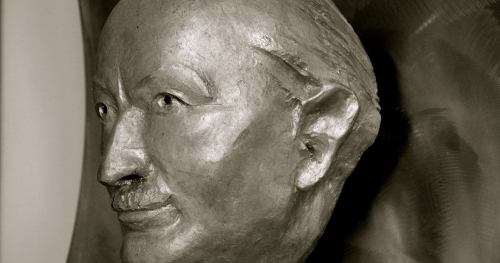
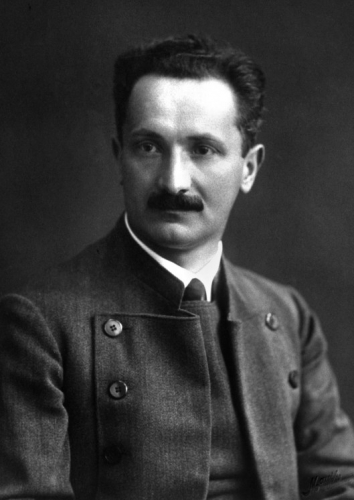
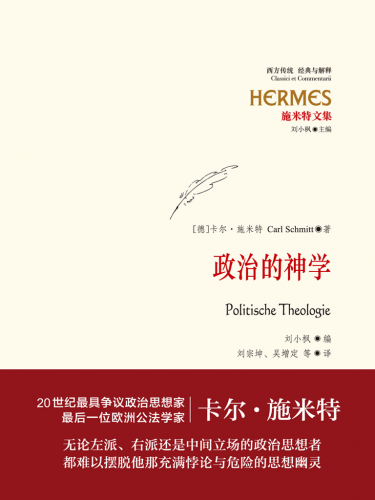
 Le professeur Xiao Bin a souligné dans son livre "De l'État, du monde et de la nature humaine à la politique : la construction du concept politique de Schmitt", que l'homme lui-même est un être dangereux. "Il prétend que la politique est un danger pour les gens." La question suivante qui se pose lorsque l'on participe à la politique est d'expliquer ce qu'est la politique, en particulier la nature de la politique. La survie de l'unité nationale exige comme condition préalable une distinction entre ennemis et amis. Une politique fondée sur la séparation des ennemis et des amis est non seulement le destin inévitable de l'unité de la nation et de l'État, mais aussi la base de son existence. Schmitt a une compréhension unique de la nature de la politique : la norme de la politique est de séparer les amis et les ennemis. En fait, ce que nous appelons la politique implique la relation entre un ami et un autre, et la différence est l'intensité de cette différence. Cependant, nous ne pouvons pas ignorer le fait que les origines théologiques les plus secrètes et les plus mystérieuses et le nationalisme allemand ont un niveau de critères différent pour séparer les amis des ennemis.
Le professeur Xiao Bin a souligné dans son livre "De l'État, du monde et de la nature humaine à la politique : la construction du concept politique de Schmitt", que l'homme lui-même est un être dangereux. "Il prétend que la politique est un danger pour les gens." La question suivante qui se pose lorsque l'on participe à la politique est d'expliquer ce qu'est la politique, en particulier la nature de la politique. La survie de l'unité nationale exige comme condition préalable une distinction entre ennemis et amis. Une politique fondée sur la séparation des ennemis et des amis est non seulement le destin inévitable de l'unité de la nation et de l'État, mais aussi la base de son existence. Schmitt a une compréhension unique de la nature de la politique : la norme de la politique est de séparer les amis et les ennemis. En fait, ce que nous appelons la politique implique la relation entre un ami et un autre, et la différence est l'intensité de cette différence. Cependant, nous ne pouvons pas ignorer le fait que les origines théologiques les plus secrètes et les plus mystérieuses et le nationalisme allemand ont un niveau de critères différent pour séparer les amis des ennemis. Du point de vue ci-dessus, la politique émerge des conflits humains et les phénomènes politiques de la société humaine sont inévitablement associés aux conflits et à la coopération. Même si vous comprenez la politique en termes de bonté et de moralité, comme Aristote, elle ne peut pas cacher l'existence du mal. Sous le bien suprême se trouve la crise du mal. L'homme est l'existence de l'incertitude, l'homme est un animal politique naturel, et où qu'il soit, il y aura des conflits. Dans les conflits, il y aura inévitablement deux camps opposés et la politique ne peut pas se débarrasser du conflit... Les deux aspects du conflit et de la confrontation nous donnent une base logique pour la division en amis et ennemis.
Du point de vue ci-dessus, la politique émerge des conflits humains et les phénomènes politiques de la société humaine sont inévitablement associés aux conflits et à la coopération. Même si vous comprenez la politique en termes de bonté et de moralité, comme Aristote, elle ne peut pas cacher l'existence du mal. Sous le bien suprême se trouve la crise du mal. L'homme est l'existence de l'incertitude, l'homme est un animal politique naturel, et où qu'il soit, il y aura des conflits. Dans les conflits, il y aura inévitablement deux camps opposés et la politique ne peut pas se débarrasser du conflit... Les deux aspects du conflit et de la confrontation nous donnent une base logique pour la division en amis et ennemis.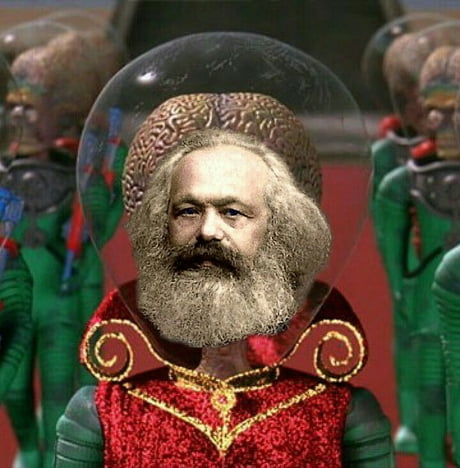
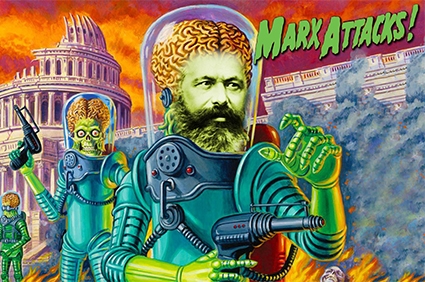
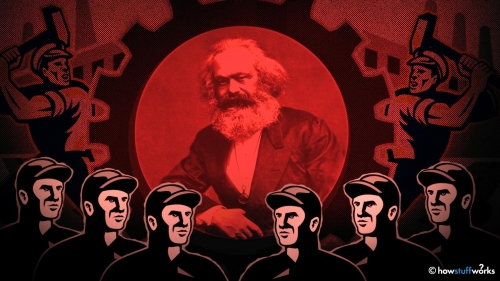
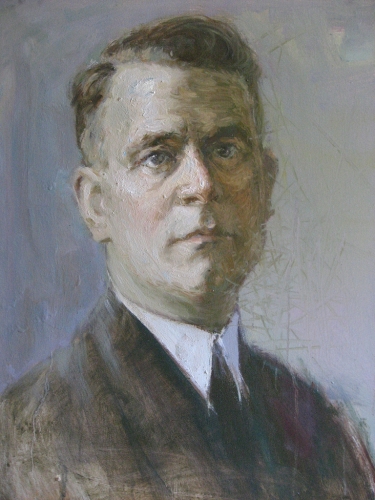
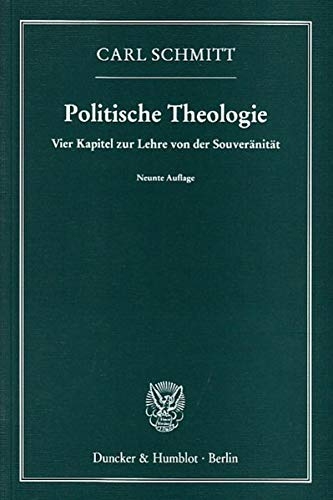 Ainsi, Schmitt en est venu à théoriser un État refondu incarnant la décision souveraine, à neutraliser les affrontements destructeurs issus des chocs entre intérêts privés, et enfin, à se positionner comme un tiers supérieur capable de faire prévaloir le dernier mot d'une autorité radicale, exprimée dans l'état d'exception, sur le conflit social. On comprend qu'avec de telles idées, Schmitt était sur une trajectoire de collision avec le conservatisme prussien politiquement hégémonique dans l'Allemagne wilhelminienne, et aussi dans uneplus large mesure dans l'Allemagne de Weimar. Le pouvoir d'État, pour l'école prussienne, plus que l'autorité transcendante, c'était l'autoritarisme immanent, et plus que la synthèse hégélienne des contraires, c'était l'affirmation monolithique d'un principe unique et ossifié. C'est pourquoi Schmitt a considéré le suicide du grand poète prussien Heinrich von Kleist - un adepte de l'idée métaphysique du Reich -, qui a eu lieu théâtralement sur les rives du lac Wannsee, comme le symbole de l'échec historique du prussianisme et comme un effet tragique de ses contradictions. Schmitt a alors développé la conviction qu'une relance de l'Europe était possible mais sur d'autres bases. Sur la base, précisément, d'une théologie politique. Très critique à l'égard de la pensée politique du Romantisme - accusé d'extravagances irréalisables - Schmitt en est néanmoins une parcelle, et ce, au moment même où il pense que la restauration de l'Esprit est possible sur des bases irrationnelles mais objectives. Greffer le point de vue prométhéen d'un nouveau mythe communautaire dans la pratique politique était plus qu'un rêve. Reconnaître le sens cosmologique de la pensée présocialiste d'un Proudhon, ou le sens poético-visionnaire d'un Theodor Däubler comme antécédents du pouvoir politique, peut sembler une rechute de Schmitt dans ces divagations très impolitiques dont il avait accusé le romantisme.
Ainsi, Schmitt en est venu à théoriser un État refondu incarnant la décision souveraine, à neutraliser les affrontements destructeurs issus des chocs entre intérêts privés, et enfin, à se positionner comme un tiers supérieur capable de faire prévaloir le dernier mot d'une autorité radicale, exprimée dans l'état d'exception, sur le conflit social. On comprend qu'avec de telles idées, Schmitt était sur une trajectoire de collision avec le conservatisme prussien politiquement hégémonique dans l'Allemagne wilhelminienne, et aussi dans uneplus large mesure dans l'Allemagne de Weimar. Le pouvoir d'État, pour l'école prussienne, plus que l'autorité transcendante, c'était l'autoritarisme immanent, et plus que la synthèse hégélienne des contraires, c'était l'affirmation monolithique d'un principe unique et ossifié. C'est pourquoi Schmitt a considéré le suicide du grand poète prussien Heinrich von Kleist - un adepte de l'idée métaphysique du Reich -, qui a eu lieu théâtralement sur les rives du lac Wannsee, comme le symbole de l'échec historique du prussianisme et comme un effet tragique de ses contradictions. Schmitt a alors développé la conviction qu'une relance de l'Europe était possible mais sur d'autres bases. Sur la base, précisément, d'une théologie politique. Très critique à l'égard de la pensée politique du Romantisme - accusé d'extravagances irréalisables - Schmitt en est néanmoins une parcelle, et ce, au moment même où il pense que la restauration de l'Esprit est possible sur des bases irrationnelles mais objectives. Greffer le point de vue prométhéen d'un nouveau mythe communautaire dans la pratique politique était plus qu'un rêve. Reconnaître le sens cosmologique de la pensée présocialiste d'un Proudhon, ou le sens poético-visionnaire d'un Theodor Däubler comme antécédents du pouvoir politique, peut sembler une rechute de Schmitt dans ces divagations très impolitiques dont il avait accusé le romantisme.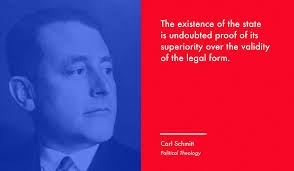
 La quadrature du cercle entre le pouvoir hiérarchique et la participation du peuple, entre la figure salvatrice du Guide et l'égalité des droits, a été réalisée par Schmitt à travers l'élaboration d'une sorte de démocratie germanique. Critiquant le concept ecclésiastique de pasteur et de fidèle (ndt : de distinction entre le pasteur « sachant » et actif et les fidèles passifs), Schmitt a écrit dans Staat, Bewegung und Volk en 1934 que "cette vision ecclésiastique est que le pasteur reste absolument transcendant par rapport au troupeau. Ce n'est pas notre concept de la Führung". Le nouveau concept de Führung, de commandement, d'autorité, Schmitt l’a en effet placé dans "l'égalité absolue de la lignée entre le leader et les suiveurs (la suite, die Folge)... Seule l'égalité de la lignée peut empêcher le pouvoir du leader de devenir tyrannique et arbitraire". De ce point de vue de la hiérarchie égalitaire, l'accès populaire aux différents rangs sociaux était garanti par le Führerprinzip, la plate-forme de masse de l'autorité charismatique. L'histoire a donc mis entre les mains de Schmitt un cas concret de théologie politique...
La quadrature du cercle entre le pouvoir hiérarchique et la participation du peuple, entre la figure salvatrice du Guide et l'égalité des droits, a été réalisée par Schmitt à travers l'élaboration d'une sorte de démocratie germanique. Critiquant le concept ecclésiastique de pasteur et de fidèle (ndt : de distinction entre le pasteur « sachant » et actif et les fidèles passifs), Schmitt a écrit dans Staat, Bewegung und Volk en 1934 que "cette vision ecclésiastique est que le pasteur reste absolument transcendant par rapport au troupeau. Ce n'est pas notre concept de la Führung". Le nouveau concept de Führung, de commandement, d'autorité, Schmitt l’a en effet placé dans "l'égalité absolue de la lignée entre le leader et les suiveurs (la suite, die Folge)... Seule l'égalité de la lignée peut empêcher le pouvoir du leader de devenir tyrannique et arbitraire". De ce point de vue de la hiérarchie égalitaire, l'accès populaire aux différents rangs sociaux était garanti par le Führerprinzip, la plate-forme de masse de l'autorité charismatique. L'histoire a donc mis entre les mains de Schmitt un cas concret de théologie politique...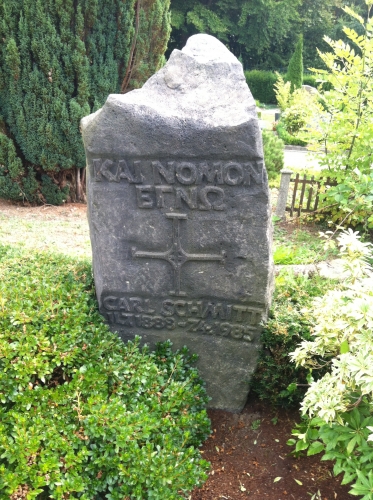



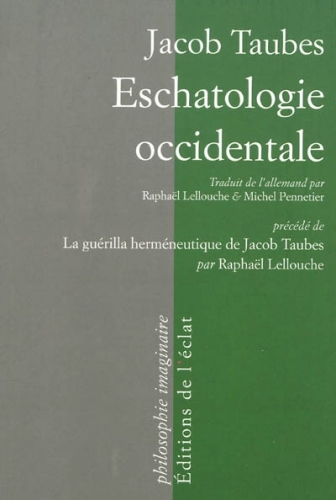
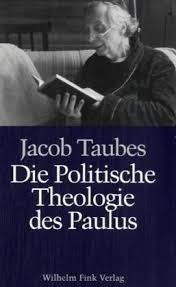 Abordons maintenant la thèse générale de Taubes, défendue dans cet ouvrage qui, en effet, peut parfois manquer d’originalité ainsi que le déploraient Strauss et Scholem. Lellouche résume fort bien le mouvement même de la pensée à laquelle nous sommes confrontés en identifiant ce courant eschatologique innervant l’histoire même de l’Occident. « L’histoire de l’Occident est un long conflit interne autour de l’enjeu central caché de l’apocalyptique. Dès les premiers siècles, le christianisme tend à se transformer en une mystique du Logos, en même temps que la dimension eschatologique perd son urgence politique et s’intériorise dans un « drame de l’âme » d’échelle cosmique. Ce n’est que résiduellement que l’apocalyptique fait résurgence dans l’ordre chrétien qui s’ouvre sur son refoulement. »
Abordons maintenant la thèse générale de Taubes, défendue dans cet ouvrage qui, en effet, peut parfois manquer d’originalité ainsi que le déploraient Strauss et Scholem. Lellouche résume fort bien le mouvement même de la pensée à laquelle nous sommes confrontés en identifiant ce courant eschatologique innervant l’histoire même de l’Occident. « L’histoire de l’Occident est un long conflit interne autour de l’enjeu central caché de l’apocalyptique. Dès les premiers siècles, le christianisme tend à se transformer en une mystique du Logos, en même temps que la dimension eschatologique perd son urgence politique et s’intériorise dans un « drame de l’âme » d’échelle cosmique. Ce n’est que résiduellement que l’apocalyptique fait résurgence dans l’ordre chrétien qui s’ouvre sur son refoulement. »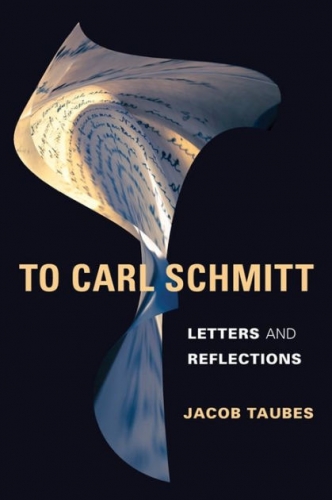 La solution à la question posée réside précisément dans la notion de fin comme eschaton : l’histoire ne semble possible que si, d’une part, se trouve posée une fin et si, d’autre part, entre le passé et la fin se trouve établi un rapport. Le moyen de parvenir à cette fin mettra en œuvre la volonté, et c’est là que l’influence de Carl Schmitt se fait certainement sentir. « Ainsi s’éclaire le rapport entre l’ordre du temps et l’ordre eschatologique du monde. Le sens unique du temps est fondé dans la volonté. »
La solution à la question posée réside précisément dans la notion de fin comme eschaton : l’histoire ne semble possible que si, d’une part, se trouve posée une fin et si, d’autre part, entre le passé et la fin se trouve établi un rapport. Le moyen de parvenir à cette fin mettra en œuvre la volonté, et c’est là que l’influence de Carl Schmitt se fait certainement sentir. « Ainsi s’éclaire le rapport entre l’ordre du temps et l’ordre eschatologique du monde. Le sens unique du temps est fondé dans la volonté. »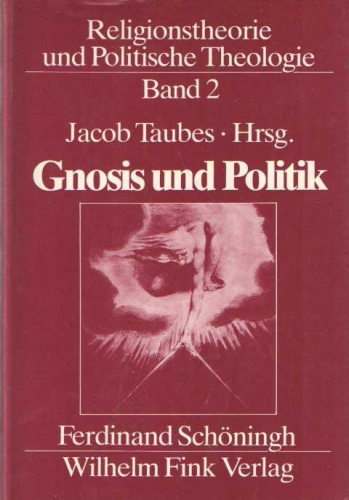 Plusieurs moments-clés de cette tendance vont être abordés : Joachim de Flore, Kant, Hegel, Marx, Kierkegaard, parmi les philosophes, mais aussi des endroits clés, si l’on peut dire, comme Israël qui va recevoir une caractérisation forte, en tant qu’il est le lieu par excellence de la révolution ; d’abord parce que le geste même d’Israël est celui de l’exil permanent, ce qui n’est autre que le sentiment général du gnostique, étant donné que le gnostique est celui qui a conscience d’avoir perdu sa patrie d’origine, qui a été exilé sur terre et dans le temps, mais aussi parce que l’exil répète le Désert : il y aurait un lien consubstantiel entre l’errance du désert et l’exil des Hébreux. « Ce sont leurs dispositions de type bédouin qui expliquent que les tribus semi-nomades d’Israël sortant d’Egypte n’aient pas élevé leur chef au rang de roi. La théocratie est construire sur le fond anarchisant de l’âme d’Israël. »
Plusieurs moments-clés de cette tendance vont être abordés : Joachim de Flore, Kant, Hegel, Marx, Kierkegaard, parmi les philosophes, mais aussi des endroits clés, si l’on peut dire, comme Israël qui va recevoir une caractérisation forte, en tant qu’il est le lieu par excellence de la révolution ; d’abord parce que le geste même d’Israël est celui de l’exil permanent, ce qui n’est autre que le sentiment général du gnostique, étant donné que le gnostique est celui qui a conscience d’avoir perdu sa patrie d’origine, qui a été exilé sur terre et dans le temps, mais aussi parce que l’exil répète le Désert : il y aurait un lien consubstantiel entre l’errance du désert et l’exil des Hébreux. « Ce sont leurs dispositions de type bédouin qui expliquent que les tribus semi-nomades d’Israël sortant d’Egypte n’aient pas élevé leur chef au rang de roi. La théocratie est construire sur le fond anarchisant de l’âme d’Israël. »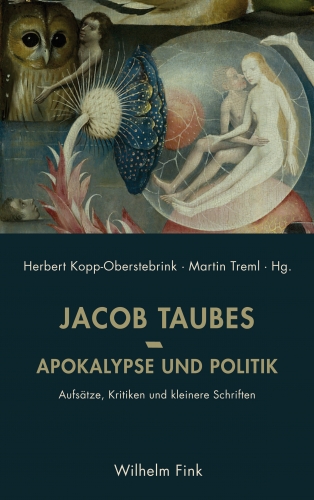 Taubes va fort logiquement accorder une place éminente à Joachim de Flore dans ce processus, dont il analyse subtilement le fameux transire qu’il rapproche de l’Aufhebung hégélienne, ainsi qu’à Thomas Münzer, pour lequel l’âme va se débarrasser de tous ses oripeaux pour renverser les puissances terrestres, afin qu’advienne ici et maintenant le règne de Dieu. Avec ces deux personnages, nous sommes en face de deux grands penseurs qui auront tenté de théoriser le moyen de dépasser dans l’immanence la simple condition mortelle. Et à partir de ce moment, toute la pensée, nous dit Taubes, va aller dans le sens d’une résorption sans cesse croissante de l’écart entre l’ici bas et la transcendance.
Taubes va fort logiquement accorder une place éminente à Joachim de Flore dans ce processus, dont il analyse subtilement le fameux transire qu’il rapproche de l’Aufhebung hégélienne, ainsi qu’à Thomas Münzer, pour lequel l’âme va se débarrasser de tous ses oripeaux pour renverser les puissances terrestres, afin qu’advienne ici et maintenant le règne de Dieu. Avec ces deux personnages, nous sommes en face de deux grands penseurs qui auront tenté de théoriser le moyen de dépasser dans l’immanence la simple condition mortelle. Et à partir de ce moment, toute la pensée, nous dit Taubes, va aller dans le sens d’une résorption sans cesse croissante de l’écart entre l’ici bas et la transcendance.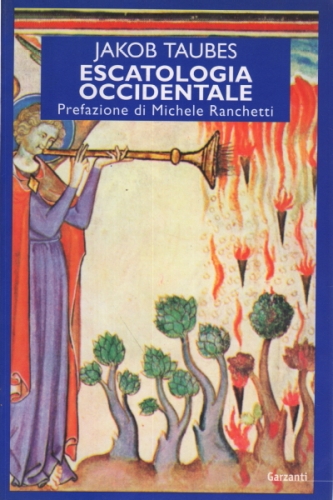 L’accomplissement de ces pensées, toujours pour Taubes, n’est autre que celle de Marx (et, dans une moindre mesure, celle de Kierkegaard) : « Si Marx philosophe sans Dieu et Kierkegaard devant Dieu, ils partagent cependant le même présupposé : la décomposition de Dieu et du monde. »
L’accomplissement de ces pensées, toujours pour Taubes, n’est autre que celle de Marx (et, dans une moindre mesure, celle de Kierkegaard) : « Si Marx philosophe sans Dieu et Kierkegaard devant Dieu, ils partagent cependant le même présupposé : la décomposition de Dieu et du monde. »
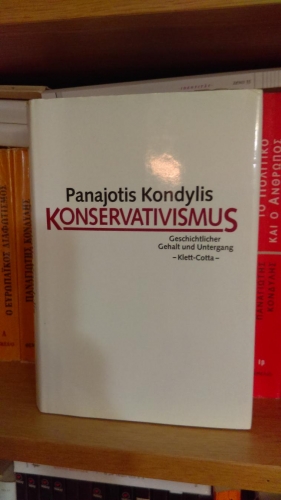
 “[C]ommonplaces of conservative self-understanding and self-presentation have crept […] into the scientific discussion,” such as “the coquettish enmity of conservatives towards theory.” The prioritization of the “concrete” over the “abstract” is itself, or relies upon, an abstraction (p. 15).
“[C]ommonplaces of conservative self-understanding and self-presentation have crept […] into the scientific discussion,” such as “the coquettish enmity of conservatives towards theory.” The prioritization of the “concrete” over the “abstract” is itself, or relies upon, an abstraction (p. 15).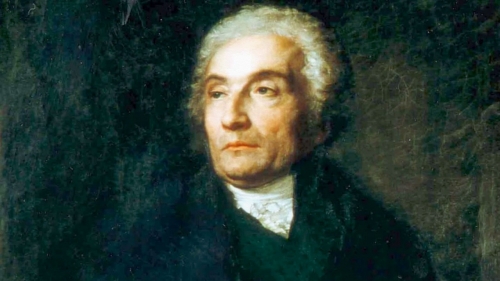

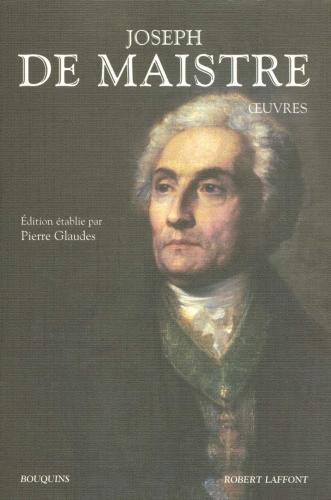
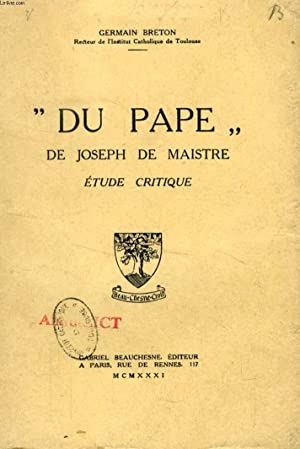 A mesure que nous nous éloignons de l'interprétation de la divine Providence, à mesure que nous nous emprisonnons dans notre refus d'être nous-mêmes interprétés par la Providence et plus nous nous soustrayons du sens, plus nous renonçons au pèlerinage pour vagabonder ; plus encore nous nous trouvons soumis, enchaînés, dépossédés, ombreux, somnambuliques. Il y a une allure propre à l'homme moderne, lente et lourde, hypnotisée et harassée. Le propre du somnambule est d'ignorer qu'il somnambulise. Quiconque s'avise de le réveiller suscitera sa rage meurtrière. Dans ce faux-sommeil nos songes sont téléguidés et nous conduisent. La difficulté à faire entrer nos contemporains dans la perspective métaphysique de Joseph de Maistre, leur antipathie instinctive pour toute considération de cette sorte tient sans doute à cette étrange addiction léthéenne. L'acte de pensée exige un effort, et de cet effort, il semble bien que les idéologies modernes soient les éminentes ennemies. Elles pourvoient inépuisablement à notre désir de ne pas penser, d'échapper à la perplexité, à l'inquiétude que suscite en nous l'idée d'une Providence. L'écrivain japonais Yasunari Kawabata définit le propre de son art comme l'exercice de ce qu'il nomme « le regard ultime »: « Si la nature est belle, c'est parce qu'elle se reflète dans mon regard ultime. »
A mesure que nous nous éloignons de l'interprétation de la divine Providence, à mesure que nous nous emprisonnons dans notre refus d'être nous-mêmes interprétés par la Providence et plus nous nous soustrayons du sens, plus nous renonçons au pèlerinage pour vagabonder ; plus encore nous nous trouvons soumis, enchaînés, dépossédés, ombreux, somnambuliques. Il y a une allure propre à l'homme moderne, lente et lourde, hypnotisée et harassée. Le propre du somnambule est d'ignorer qu'il somnambulise. Quiconque s'avise de le réveiller suscitera sa rage meurtrière. Dans ce faux-sommeil nos songes sont téléguidés et nous conduisent. La difficulté à faire entrer nos contemporains dans la perspective métaphysique de Joseph de Maistre, leur antipathie instinctive pour toute considération de cette sorte tient sans doute à cette étrange addiction léthéenne. L'acte de pensée exige un effort, et de cet effort, il semble bien que les idéologies modernes soient les éminentes ennemies. Elles pourvoient inépuisablement à notre désir de ne pas penser, d'échapper à la perplexité, à l'inquiétude que suscite en nous l'idée d'une Providence. L'écrivain japonais Yasunari Kawabata définit le propre de son art comme l'exercice de ce qu'il nomme « le regard ultime »: « Si la nature est belle, c'est parce qu'elle se reflète dans mon regard ultime. » 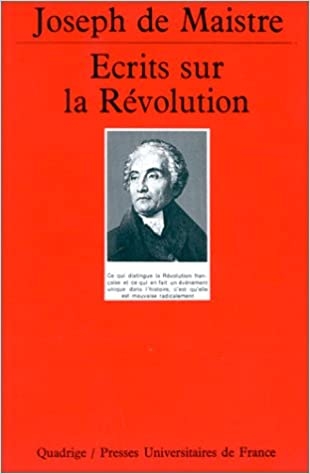 Les Soirées de Saint-Pétersbourg me semblent une méditation de cette envergure à nos usages français. Les voix qui s'entrecroisent au-dessus du cours du fleuve qui s'abandonne dans le soir édifient doucement, songeusement, une impondérable demeure de sérénité au-dessus des malheurs du temps. La conversation (et l'on ne saurait assez redire à quel point toute civilité, toute politique digne de ce nom, tout bonheur humain dépendent avant tout de l'art de converser) éveille, par touches successives, ce qui, dans l'entendement humain, s'est ensommeillé. Ces échanges poursuivent avec délicatesse le dessein de nous éveiller peu à peu de nos torpeurs. Sans doute a-t-il échappé aux quelques bons auteurs qui crurent voir dans les Soirées l'expression d'une pensée « fanatique » ou « totalitaire » que l'auteur désire à peine nous convaincre, à nous établir dans une conviction. On chercherait en vain, chez Joseph de Maistre, homme de bonne compagnie, cette compulsion à subordonner l'interlocuteur à ses avis par l'usage du chantage moral. Si quelques certitudes magnifiques fleurissent de ces entretiens, c'est dans l'entrelacs des voix humaines. Le lecteur auquel s'adresse Joseph de Maistre n'est point obligé à changer en mot d'ordre ou de propagande ces corolles de l'Intellect. Ce qui est exigé de lui, en revanche, c'est bien de se tenir attentif entre les échanges, d'être à l'affût entre les questions et les réponses qui ne sont elles-mêmes que de nouvelles questions. C'est à ce titre seulement qu'il pourra être au diapason de sa lecture, non par une adhésion, mais comme un quatrième interlocuteur.
Les Soirées de Saint-Pétersbourg me semblent une méditation de cette envergure à nos usages français. Les voix qui s'entrecroisent au-dessus du cours du fleuve qui s'abandonne dans le soir édifient doucement, songeusement, une impondérable demeure de sérénité au-dessus des malheurs du temps. La conversation (et l'on ne saurait assez redire à quel point toute civilité, toute politique digne de ce nom, tout bonheur humain dépendent avant tout de l'art de converser) éveille, par touches successives, ce qui, dans l'entendement humain, s'est ensommeillé. Ces échanges poursuivent avec délicatesse le dessein de nous éveiller peu à peu de nos torpeurs. Sans doute a-t-il échappé aux quelques bons auteurs qui crurent voir dans les Soirées l'expression d'une pensée « fanatique » ou « totalitaire » que l'auteur désire à peine nous convaincre, à nous établir dans une conviction. On chercherait en vain, chez Joseph de Maistre, homme de bonne compagnie, cette compulsion à subordonner l'interlocuteur à ses avis par l'usage du chantage moral. Si quelques certitudes magnifiques fleurissent de ces entretiens, c'est dans l'entrelacs des voix humaines. Le lecteur auquel s'adresse Joseph de Maistre n'est point obligé à changer en mot d'ordre ou de propagande ces corolles de l'Intellect. Ce qui est exigé de lui, en revanche, c'est bien de se tenir attentif entre les échanges, d'être à l'affût entre les questions et les réponses qui ne sont elles-mêmes que de nouvelles questions. C'est à ce titre seulement qu'il pourra être au diapason de sa lecture, non par une adhésion, mais comme un quatrième interlocuteur. 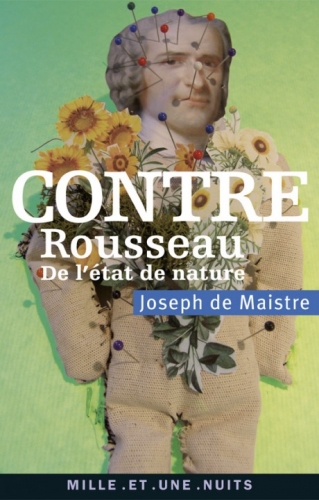
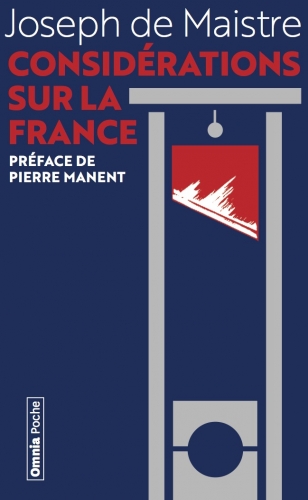
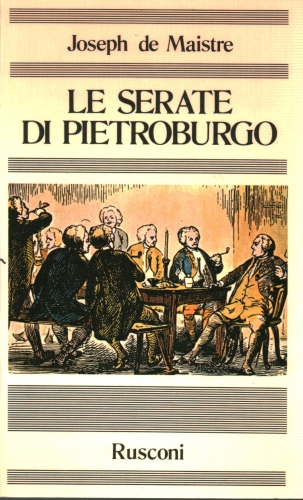
 Ce philosophe que même un esprit affiné comme Cioran se laisse aller à qualifier de « dogmatique » ou « fanatique », notre privilège de quatrième interlocuteur nous donnera ainsi à le comprendre, au contraire, comme un professeur d'instabilité et d'inquiétude. Entre l'au-delà et l'en deçà se jouent nos carrières incertaines. Le sens hiérarchique que supposent de telles spéculations offusque nos égalitaristes qui, à refuser de penser la hiérarchie, succombent aux plus viles iniquités. Cette hiérarchie, qu'ils se sauraient voir, ils consentent à s'y plier aveuglement lorsqu'elle n'est plus que parodie et pure brutalité. De même, ces prétendus « individus libres » dont les bouches débordent de sarcasmes et de haine pour notre Royaume de France s'enfermeront dans leurs appartenances biologiques, sexuelles ou raciales, à triple tour, avec la bonne conscience des « minorités opprimées »; ces prétendus parangons d'universalisme s'acharneront sans relâche à la désagrégation du Pays, à sa décomposition en communautés d'intérêts ou de nature plus ou moins incertaines pour détruire toute trace de cette disposition providentielle que fut le Royaume de France et dont la nation fut l'héritière ingrate et quelque peu acariâtre. Les déterminismes les plus obtus, que la science consacre et qui les réduisent au rang de termites leur sembleront infiniment préférables aux libertés providentielles pourvu qu'ils en détinssent le pouvoir de cracher au visage de toute autorité, c'est-à-dire, de toute générosité. La tournure avaricieuse, cupide, égolâtrique de l'homme moderne tient là son origine, funeste à la fois pour la gloire et la grandeur de toute civilisation et pour la beauté des moments fugitifs qui nous étreignent et nous ravissent.
Ce philosophe que même un esprit affiné comme Cioran se laisse aller à qualifier de « dogmatique » ou « fanatique », notre privilège de quatrième interlocuteur nous donnera ainsi à le comprendre, au contraire, comme un professeur d'instabilité et d'inquiétude. Entre l'au-delà et l'en deçà se jouent nos carrières incertaines. Le sens hiérarchique que supposent de telles spéculations offusque nos égalitaristes qui, à refuser de penser la hiérarchie, succombent aux plus viles iniquités. Cette hiérarchie, qu'ils se sauraient voir, ils consentent à s'y plier aveuglement lorsqu'elle n'est plus que parodie et pure brutalité. De même, ces prétendus « individus libres » dont les bouches débordent de sarcasmes et de haine pour notre Royaume de France s'enfermeront dans leurs appartenances biologiques, sexuelles ou raciales, à triple tour, avec la bonne conscience des « minorités opprimées »; ces prétendus parangons d'universalisme s'acharneront sans relâche à la désagrégation du Pays, à sa décomposition en communautés d'intérêts ou de nature plus ou moins incertaines pour détruire toute trace de cette disposition providentielle que fut le Royaume de France et dont la nation fut l'héritière ingrate et quelque peu acariâtre. Les déterminismes les plus obtus, que la science consacre et qui les réduisent au rang de termites leur sembleront infiniment préférables aux libertés providentielles pourvu qu'ils en détinssent le pouvoir de cracher au visage de toute autorité, c'est-à-dire, de toute générosité. La tournure avaricieuse, cupide, égolâtrique de l'homme moderne tient là son origine, funeste à la fois pour la gloire et la grandeur de toute civilisation et pour la beauté des moments fugitifs qui nous étreignent et nous ravissent.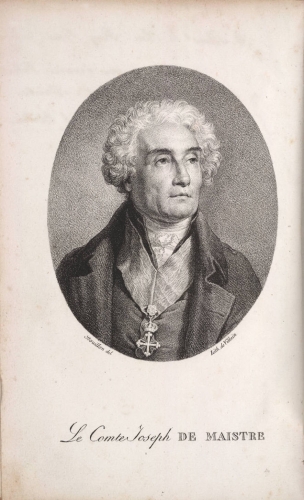
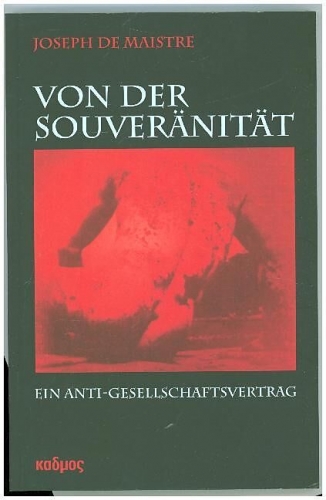
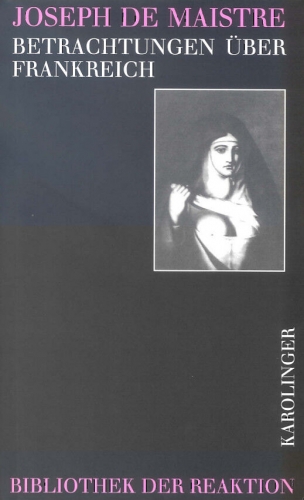
 Les Soirées de Saint-Pétersbourg nous initient à une exactitude légère, une Sapience débarrassée de ses instrumentations techniques, une science noble et profonde dont le souci est d'alléger la vie, de la désentraver des déterminismes aussi fastidieux que faux qui nous emprisonnent dans l'immanence, dans la nature, dans la pesanteur. Ce qu'il importe d'aviver ou de raviver dans l'entendement humain n'est autre que la faculté d'intuition. A quoi bon une science qui nous rend plus sourd, plus lourd, plus soumis? De quelle vérité peut-elle bien se targuer si, par elle, la laideur nous entraîne vers le bas ? Il ne s'agit point de renoncer à la raison mais d'en susciter l'envol. D'une lecture maistrienne des temps présents, nous pourrons induire une attention nouvelle, une exactitude désentravée, vive pour tout dire. Alors que la critique moderne, comme l'eût dit Kierkegaard, n'aime les papillons que lorsqu'ils sont épinglés et les aigles qu'après leur passage chez le taxidermiste, la perspective maistrienne nous enseigne cette rayonnante humilité qui, pour éprise éperdument qu'elle soit du Vrai, n'en consent pas moins à le perdre de vue dans les envols de la beauté, sans en conclure pour autant que ce qui est perdu de vue n'existe pas.
Les Soirées de Saint-Pétersbourg nous initient à une exactitude légère, une Sapience débarrassée de ses instrumentations techniques, une science noble et profonde dont le souci est d'alléger la vie, de la désentraver des déterminismes aussi fastidieux que faux qui nous emprisonnent dans l'immanence, dans la nature, dans la pesanteur. Ce qu'il importe d'aviver ou de raviver dans l'entendement humain n'est autre que la faculté d'intuition. A quoi bon une science qui nous rend plus sourd, plus lourd, plus soumis? De quelle vérité peut-elle bien se targuer si, par elle, la laideur nous entraîne vers le bas ? Il ne s'agit point de renoncer à la raison mais d'en susciter l'envol. D'une lecture maistrienne des temps présents, nous pourrons induire une attention nouvelle, une exactitude désentravée, vive pour tout dire. Alors que la critique moderne, comme l'eût dit Kierkegaard, n'aime les papillons que lorsqu'ils sont épinglés et les aigles qu'après leur passage chez le taxidermiste, la perspective maistrienne nous enseigne cette rayonnante humilité qui, pour éprise éperdument qu'elle soit du Vrai, n'en consent pas moins à le perdre de vue dans les envols de la beauté, sans en conclure pour autant que ce qui est perdu de vue n'existe pas. 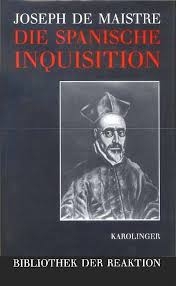 « Les témoins de la vérité viennent de tous les côtés et se présentent d'eux-mêmes: jamais ils ne se sont parlé, jamais ils ne se contredisent... » La vérité de la Tradition n'est point dans la reproduction des formes mais dans l'instant qui les suscite. Dans le très beau récit du retour à Beauregard, face à la déchéance des formes, de la tradition au sens historique, Joseph de Maistre fera intervenir la divine Providence. L'Idiot qui, par pure ingratitude a pris la place du Maître, est peut-être aussi la voix de Dieu. « Ce que Dieu fait n'est point sans raison pour votre bien. Levez-vous, c'est Dieu qui fait chanter là-bas cet idiot sur vos ruines pour vous montrer le néant des vanités humaines. Regardez en face le spectacle, car il est digne de vous, et redites-le à vos enfants. » Faire face à la destruction des formes, sans s'illusionner, peut-être est-ce en effet une chance d'atteindre au « sans-forme » dont parlent les métaphysiques les plus exigeantes d'Orient et d'Occident. Le Dieu apophatique de Maître Eckhart et de Jean Tauler, le « neti neti » du Védantâ, le « tao » de Lao-Tseu et de Lie-Tuez, « l'Inconditionné » dont parle René Guénon, sont peut-être la chance éblouissante à saisir dans la considération objective, à la fois distante et miséricordieuse, de la destruction des formes.
« Les témoins de la vérité viennent de tous les côtés et se présentent d'eux-mêmes: jamais ils ne se sont parlé, jamais ils ne se contredisent... » La vérité de la Tradition n'est point dans la reproduction des formes mais dans l'instant qui les suscite. Dans le très beau récit du retour à Beauregard, face à la déchéance des formes, de la tradition au sens historique, Joseph de Maistre fera intervenir la divine Providence. L'Idiot qui, par pure ingratitude a pris la place du Maître, est peut-être aussi la voix de Dieu. « Ce que Dieu fait n'est point sans raison pour votre bien. Levez-vous, c'est Dieu qui fait chanter là-bas cet idiot sur vos ruines pour vous montrer le néant des vanités humaines. Regardez en face le spectacle, car il est digne de vous, et redites-le à vos enfants. » Faire face à la destruction des formes, sans s'illusionner, peut-être est-ce en effet une chance d'atteindre au « sans-forme » dont parlent les métaphysiques les plus exigeantes d'Orient et d'Occident. Le Dieu apophatique de Maître Eckhart et de Jean Tauler, le « neti neti » du Védantâ, le « tao » de Lao-Tseu et de Lie-Tuez, « l'Inconditionné » dont parle René Guénon, sont peut-être la chance éblouissante à saisir dans la considération objective, à la fois distante et miséricordieuse, de la destruction des formes. 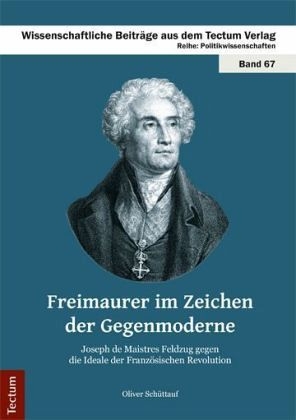 Qu'en est-il alors de la mise en demeure maistrienne ? Quel « Idiot » prophétique devrons-nous écouter comme étant la voix de Dieu, lorsque l'idiotie s'est généralisée et que la voix du Sage apparaît comme celle du fou? Quelle forme reste-t-il à détruire lorsque tout est déjà réduit à l'informe, de quelle condition se libérer lorsque nous en sommes à une reddition sans conditions ? A quelle défaite humblement consentir, lorsque le souvenir de toute victoire et de toute défaite nous a quittés ? Quelle anamnésis évoquer lorsque nous avons oublié notre oubli ? Dans quel exil puiser la force du retour, lorsque nous sommes exilés de l'exil ? Ce à quoi nous devons faire face est au-delà, désormais, de la situation maistrienne décrite par Charles-Albert de Costa de Beauregard: « Ainsi ballotté entre l'exil et une patrie plus inhospitalière encore, le pauvre esquif indécis ne savait où se rendre... » La patrie et l'exil sont oubliés et c'est au cœur de cet oubli que nous devons prendre source, établir notre règne en esprit, mais par quelle grâce ? L'enseignement du « regard ultime » abolit le temps, frappe d'inconsistance les religions elles-mêmes pour nous initier à la pure Sapience de la prière. Il n'y a plus même de formes à détruire, puisque nous sommes déjà dans l'informe et que l'informe est indestructible. Tel est bien le paradoxe admirable, ce paradoxe auquel il faut faire face, qu'il faut voir et regarder sans défaillir. Si la forme détruite peut nous donner accès au Sans-Forme, à la transcendance pure du « Sans Nom », l'informe, qui ne peut-être détruit, car il est lui-même destruction permanente de toute forme émergeante, ne donne accès à rien, sinon qu'à lui-même. De ce comble de ténèbres, il importe cependant de faire, à partir du plus infime iota de la lumière incréée, un embrasement.
Qu'en est-il alors de la mise en demeure maistrienne ? Quel « Idiot » prophétique devrons-nous écouter comme étant la voix de Dieu, lorsque l'idiotie s'est généralisée et que la voix du Sage apparaît comme celle du fou? Quelle forme reste-t-il à détruire lorsque tout est déjà réduit à l'informe, de quelle condition se libérer lorsque nous en sommes à une reddition sans conditions ? A quelle défaite humblement consentir, lorsque le souvenir de toute victoire et de toute défaite nous a quittés ? Quelle anamnésis évoquer lorsque nous avons oublié notre oubli ? Dans quel exil puiser la force du retour, lorsque nous sommes exilés de l'exil ? Ce à quoi nous devons faire face est au-delà, désormais, de la situation maistrienne décrite par Charles-Albert de Costa de Beauregard: « Ainsi ballotté entre l'exil et une patrie plus inhospitalière encore, le pauvre esquif indécis ne savait où se rendre... » La patrie et l'exil sont oubliés et c'est au cœur de cet oubli que nous devons prendre source, établir notre règne en esprit, mais par quelle grâce ? L'enseignement du « regard ultime » abolit le temps, frappe d'inconsistance les religions elles-mêmes pour nous initier à la pure Sapience de la prière. Il n'y a plus même de formes à détruire, puisque nous sommes déjà dans l'informe et que l'informe est indestructible. Tel est bien le paradoxe admirable, ce paradoxe auquel il faut faire face, qu'il faut voir et regarder sans défaillir. Si la forme détruite peut nous donner accès au Sans-Forme, à la transcendance pure du « Sans Nom », l'informe, qui ne peut-être détruit, car il est lui-même destruction permanente de toute forme émergeante, ne donne accès à rien, sinon qu'à lui-même. De ce comble de ténèbres, il importe cependant de faire, à partir du plus infime iota de la lumière incréée, un embrasement.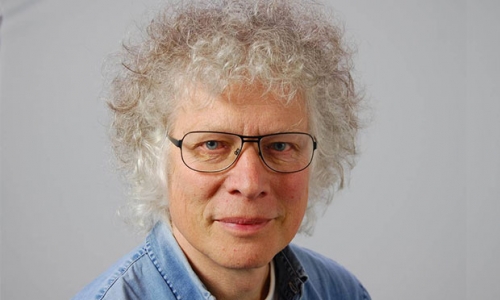
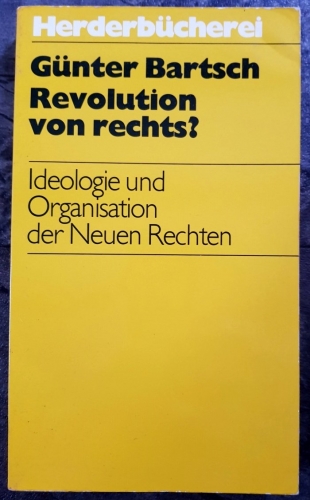 J’ai entendu parler pour la première fois de Henning Eichberg sous le pseudonyme de Hartwig Singer, dans un ouvrage important de Günter Bartsch, historien des idées contemporaines, du trotskisme, de l’anarchisme et des nouvelles droites. Le volume qui traitait des « nouvelles droites » après les événements de 1968 s’intitulait Revolution von rechts ? (1975). Bartsch avait parfaitement saisi la nouveauté et la pertinence des idées véhiculées par cette myriade de groupuscules très actifs, très soucieux d’étayer leurs affirmations impavides par des références théoriques solides, aussi solides que celles des marxistes de l’opposition dite extra-parlementaire, animée notamment par Rudi Dutschke. Dès la parution de cet ouvrage de Bartsch, découvert à la librairie du Passage 44 à Bruxelles, je me suis senti en communion avec ces idées véhiculées de Munich à Hambourg et de Cologne à Berlin. Bartsch lui-même avait eu un itinéraire fascinant, expliquant l’objectivité et l’empathie qu’il cultivait à l’endroit de toutes les mouvances qu’il étudiait et dont il explorait le corpus doctrinal. Né en 1927, mobilisé à 17 ans dans la Wehrmacht, membre du parti communiste allemand et animateur important de la FDJ (les jeunesses du KPD), il est déçu par la répression féroce du soulèvement populaire berlinois de juin 1953 et passe à l’Ouest, où il deviendra journaliste et enquêteur. Ses thèmes de prédilection ont été les mouvances politiques extra-parlementaires. Notons également que Bartsch se tournera à la fin de sa vie vers l’anthroposophie de Steiner, dont il tirera bon nombre d’enseignements pour fonder son propre mouvement « écosophique » qui le rapprochera de Baldur Springmann, pionnier de l’écologie folciste (völkisch), qui participera à l’Université d’été de « Synergies européennes » en 1998 dans le Trentin, où, âgé de 87 ans, il reçut un accueil des plus chaleureux par de jeunes Italiens, adeptes du style Wandervogel. Le livre de Bartsch a été déterminant dans mes options métapolitiques futures et ce livre demeure un classique qui devrait être relu sans relâche, pour bien connaître la généalogie de la mouvance « nouvelle droite ».
J’ai entendu parler pour la première fois de Henning Eichberg sous le pseudonyme de Hartwig Singer, dans un ouvrage important de Günter Bartsch, historien des idées contemporaines, du trotskisme, de l’anarchisme et des nouvelles droites. Le volume qui traitait des « nouvelles droites » après les événements de 1968 s’intitulait Revolution von rechts ? (1975). Bartsch avait parfaitement saisi la nouveauté et la pertinence des idées véhiculées par cette myriade de groupuscules très actifs, très soucieux d’étayer leurs affirmations impavides par des références théoriques solides, aussi solides que celles des marxistes de l’opposition dite extra-parlementaire, animée notamment par Rudi Dutschke. Dès la parution de cet ouvrage de Bartsch, découvert à la librairie du Passage 44 à Bruxelles, je me suis senti en communion avec ces idées véhiculées de Munich à Hambourg et de Cologne à Berlin. Bartsch lui-même avait eu un itinéraire fascinant, expliquant l’objectivité et l’empathie qu’il cultivait à l’endroit de toutes les mouvances qu’il étudiait et dont il explorait le corpus doctrinal. Né en 1927, mobilisé à 17 ans dans la Wehrmacht, membre du parti communiste allemand et animateur important de la FDJ (les jeunesses du KPD), il est déçu par la répression féroce du soulèvement populaire berlinois de juin 1953 et passe à l’Ouest, où il deviendra journaliste et enquêteur. Ses thèmes de prédilection ont été les mouvances politiques extra-parlementaires. Notons également que Bartsch se tournera à la fin de sa vie vers l’anthroposophie de Steiner, dont il tirera bon nombre d’enseignements pour fonder son propre mouvement « écosophique » qui le rapprochera de Baldur Springmann, pionnier de l’écologie folciste (völkisch), qui participera à l’Université d’été de « Synergies européennes » en 1998 dans le Trentin, où, âgé de 87 ans, il reçut un accueil des plus chaleureux par de jeunes Italiens, adeptes du style Wandervogel. Le livre de Bartsch a été déterminant dans mes options métapolitiques futures et ce livre demeure un classique qui devrait être relu sans relâche, pour bien connaître la généalogie de la mouvance « nouvelle droite ».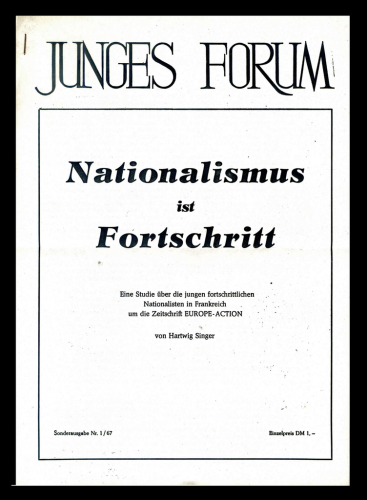
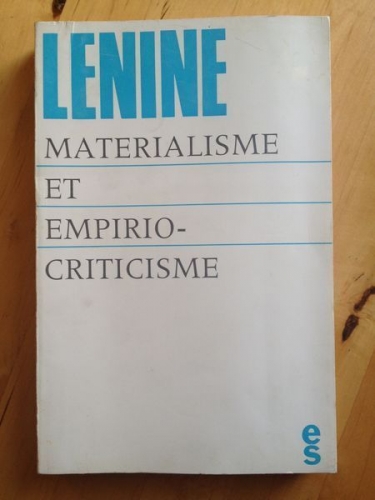
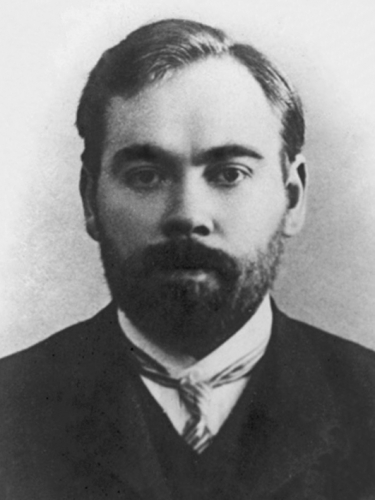
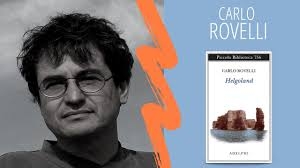
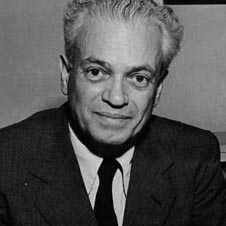 Ils donnaient ainsi l’impression de virevolter au gré des modes et de n’être pas sérieux. Aujourd’hui, le travail de Rovelli ne semble pas susciter davantage d’intérêt chez eux. Pour Eichberg, ajouterions-nous, l’empirisme logique était spécifiquement européen (occidental) car il rejetait les instances figées pour observer des dynamiques à l’œuvre dans le monde et au sein même de la matière. Pour ses homologues français, cette spécificité occidentale, le « syndrome occidental » disait à l’époque Eichberg/Hartwig, servait à rejeter un déisme trop figé et, simultanément, un communisme tout aussi figé parce que léniniste et non bogdanovien (non proudhonien).
Ils donnaient ainsi l’impression de virevolter au gré des modes et de n’être pas sérieux. Aujourd’hui, le travail de Rovelli ne semble pas susciter davantage d’intérêt chez eux. Pour Eichberg, ajouterions-nous, l’empirisme logique était spécifiquement européen (occidental) car il rejetait les instances figées pour observer des dynamiques à l’œuvre dans le monde et au sein même de la matière. Pour ses homologues français, cette spécificité occidentale, le « syndrome occidental » disait à l’époque Eichberg/Hartwig, servait à rejeter un déisme trop figé et, simultanément, un communisme tout aussi figé parce que léniniste et non bogdanovien (non proudhonien). Son premier engagement se fera, vers treize ou quatorze ans, dans la Deutsch-Soziale Union d’Otto Strasser. Par la suite, il sera un rédacteur régulier de la revue Nation Europa, fondée par Arthur Ehrhardt. Cette collaboration durera de 1961 à 1974. Cette assiduité militante ne l’empêche nullement de réussir de brillantes études de sociologie, notamment en explorant des thèmes tels que l’histoire de la technique et la sociologie du sport (sujet sur lequel il poursuivra une longue carrière universitaire, en Allemagne comme au Danemark). Sa culture actualisée et non nostalgique fait de lui la figure jeune la plus prometteuse de la petite mouvance néo-droitiste en Allemagne dans les années 1960.
Son premier engagement se fera, vers treize ou quatorze ans, dans la Deutsch-Soziale Union d’Otto Strasser. Par la suite, il sera un rédacteur régulier de la revue Nation Europa, fondée par Arthur Ehrhardt. Cette collaboration durera de 1961 à 1974. Cette assiduité militante ne l’empêche nullement de réussir de brillantes études de sociologie, notamment en explorant des thèmes tels que l’histoire de la technique et la sociologie du sport (sujet sur lequel il poursuivra une longue carrière universitaire, en Allemagne comme au Danemark). Sa culture actualisée et non nostalgique fait de lui la figure jeune la plus prometteuse de la petite mouvance néo-droitiste en Allemagne dans les années 1960.




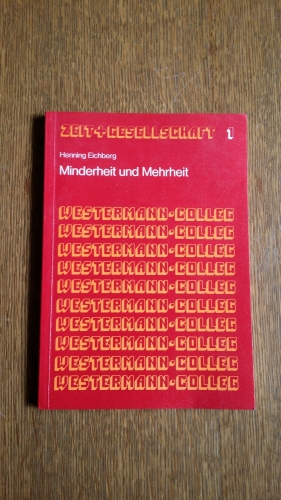

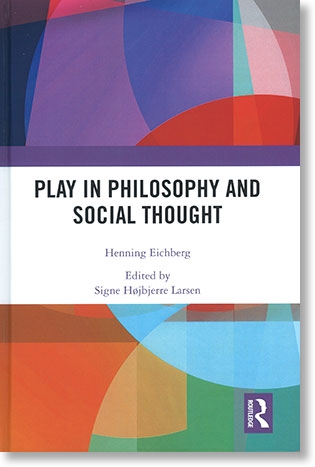
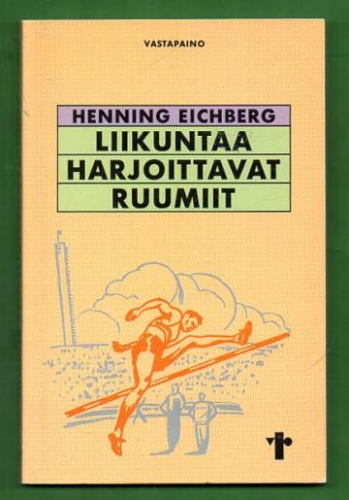
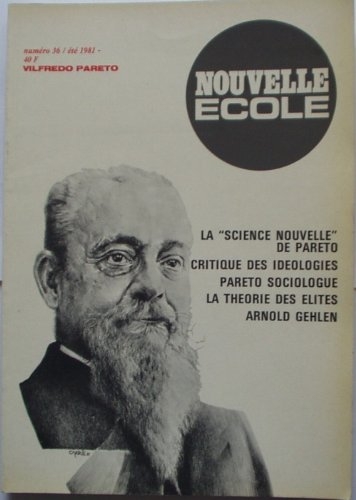 (1) Dans le numéro 36 de Nouvelle école, consacré à Vilfredo Pareto et impulsé par Guillaume Faye (seule voix raisonnable à l’époque dans cet aréopage de fanfarons sans réelle culture), j’ai voulu introduire, dans mes deux articles, les linéaments de la querelle des sociologues allemands (ou querelle allemande des sciences sociales). On m’a pris pour un fou. Le pontife qui entendait mener la danse, avec la lourdeur d’un ours de mauvais cirque, préparait son aggiornamento néolibéral et thatcheroïde. Il le ratera lamentablement. Une bonne connaissance de l’empiriocriticisme, via le pamphlet de Lénine (et via les thèses sur Lénine de Henri Lefebvre avec qui Faye entretenait d’excellentes relations), et de la querelle des sociologues allemands, dont Habermas, que Faye lisait attentivement, aurait permis d’être au diapason. Et de le rester. Quarante ans après, après que Faye et moi-même eurent tiré notre révérence, après notre ostracisme par fatwas hystériques répétées à satiété, on patauge toujours dans le solipsisme, dans la doxa à deux balles et surtout dans un insupportable parisianisme.
(1) Dans le numéro 36 de Nouvelle école, consacré à Vilfredo Pareto et impulsé par Guillaume Faye (seule voix raisonnable à l’époque dans cet aréopage de fanfarons sans réelle culture), j’ai voulu introduire, dans mes deux articles, les linéaments de la querelle des sociologues allemands (ou querelle allemande des sciences sociales). On m’a pris pour un fou. Le pontife qui entendait mener la danse, avec la lourdeur d’un ours de mauvais cirque, préparait son aggiornamento néolibéral et thatcheroïde. Il le ratera lamentablement. Une bonne connaissance de l’empiriocriticisme, via le pamphlet de Lénine (et via les thèses sur Lénine de Henri Lefebvre avec qui Faye entretenait d’excellentes relations), et de la querelle des sociologues allemands, dont Habermas, que Faye lisait attentivement, aurait permis d’être au diapason. Et de le rester. Quarante ans après, après que Faye et moi-même eurent tiré notre révérence, après notre ostracisme par fatwas hystériques répétées à satiété, on patauge toujours dans le solipsisme, dans la doxa à deux balles et surtout dans un insupportable parisianisme.
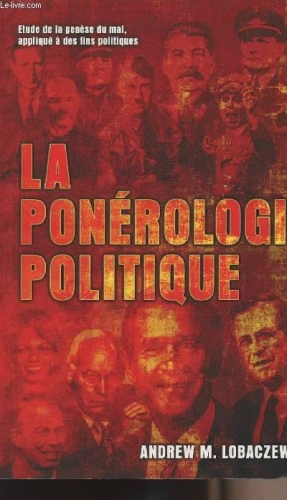 Le premier manuscrit de cet ouvrage a été jeté au feu cinq minutes avant l’arrivée de la police secrète en Pologne communiste.
Le premier manuscrit de cet ouvrage a été jeté au feu cinq minutes avant l’arrivée de la police secrète en Pologne communiste. 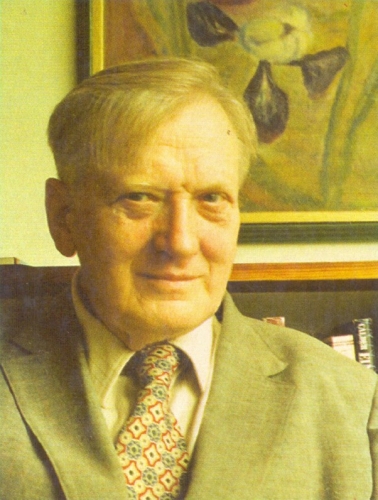
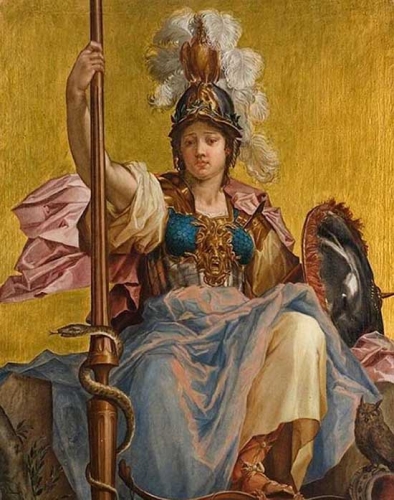
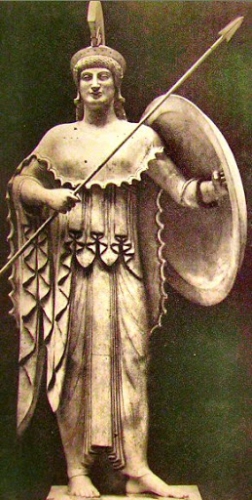 Le loisir, période de temps échappant à l’empire de la nécessité et des activités en relation avec celle-ci (travail, économie, etc) s’identifie au bonheur personnel. Néanmoins sa condition de possibilité réside dans le bien de l’Etat. Ce dernier à son tour permet par son existence d’actualiser les capacités et les facultés spirituelles et morales de l’homme. Le but de la politique n’est pas la morale mais de rendre possible l’existence de celle-ci. C’est en ce sens que la morale dépend de la politique et non au sens où cette dernière dicterait les fins de la morale (tentation de la Pensée Unique contemporaine…). Pas plus qu’il ne s’agira de résorber le bonheur individuel dans un hypothétique bonheur collectif.
Le loisir, période de temps échappant à l’empire de la nécessité et des activités en relation avec celle-ci (travail, économie, etc) s’identifie au bonheur personnel. Néanmoins sa condition de possibilité réside dans le bien de l’Etat. Ce dernier à son tour permet par son existence d’actualiser les capacités et les facultés spirituelles et morales de l’homme. Le but de la politique n’est pas la morale mais de rendre possible l’existence de celle-ci. C’est en ce sens que la morale dépend de la politique et non au sens où cette dernière dicterait les fins de la morale (tentation de la Pensée Unique contemporaine…). Pas plus qu’il ne s’agira de résorber le bonheur individuel dans un hypothétique bonheur collectif. 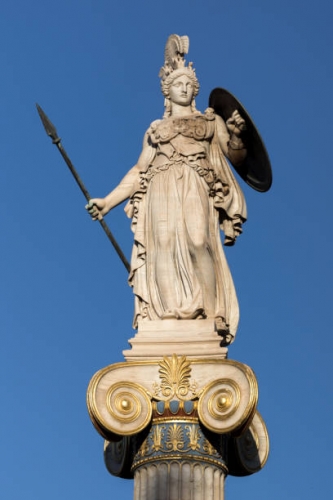 Dans son dialogue “le Politique”, Platon rapporte le mythe selon lequel, dans un temps originel – celui de Cronos – toute chose fonctionnait en sens inverse de celui de l’ordre actuel, c’est-à-dire dans le sens originel. Cet ordre s’appliquait aussi bien aux cycles astronomiques qu’aux cycles vitaux,ainsi l’homme rajeunissait tout au long de sa croissance.
Dans son dialogue “le Politique”, Platon rapporte le mythe selon lequel, dans un temps originel – celui de Cronos – toute chose fonctionnait en sens inverse de celui de l’ordre actuel, c’est-à-dire dans le sens originel. Cet ordre s’appliquait aussi bien aux cycles astronomiques qu’aux cycles vitaux,ainsi l’homme rajeunissait tout au long de sa croissance. 
 Machiavel, lui, a désacralisé la politique, il en fait un simple instrument humain, profane, elle n’est plus ordonnée à une fin supérieure, transcendante. La question est de savoir comment prendre le pouvoir et le conserver. L’essentiel est la stabilité de l’Etat, ce qui est une redondance puisque “Lo Stato” est ce qui tient debout.
Machiavel, lui, a désacralisé la politique, il en fait un simple instrument humain, profane, elle n’est plus ordonnée à une fin supérieure, transcendante. La question est de savoir comment prendre le pouvoir et le conserver. L’essentiel est la stabilité de l’Etat, ce qui est une redondance puisque “Lo Stato” est ce qui tient debout.
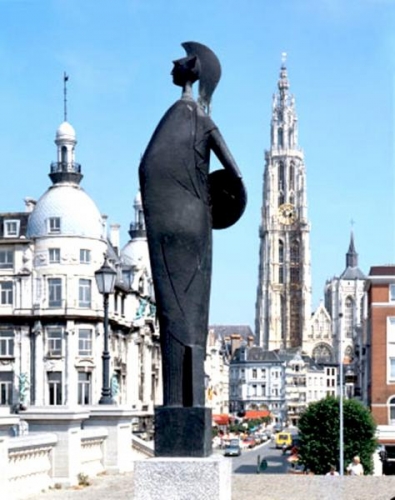 Poussée à l’extrême la thèse d’un droit naturel idéal débouche sur la conception d’un idéal de justice existant au-dessus du droit positif. “Il existe un Droit universel et immuable, source de toutes les législations positives, il n’est que la raison naturelle en tant qu’elle gouverne les hommes” (Avant-projet du Code Civil de l’An VIII).
Poussée à l’extrême la thèse d’un droit naturel idéal débouche sur la conception d’un idéal de justice existant au-dessus du droit positif. “Il existe un Droit universel et immuable, source de toutes les législations positives, il n’est que la raison naturelle en tant qu’elle gouverne les hommes” (Avant-projet du Code Civil de l’An VIII). 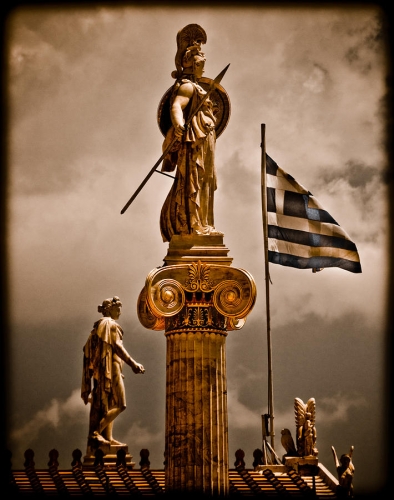

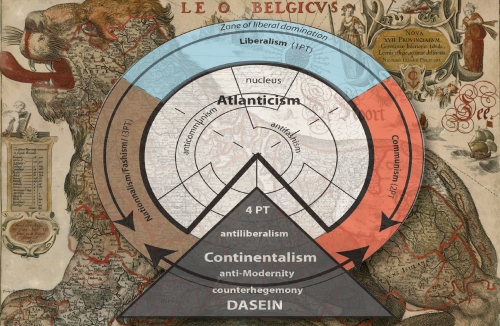
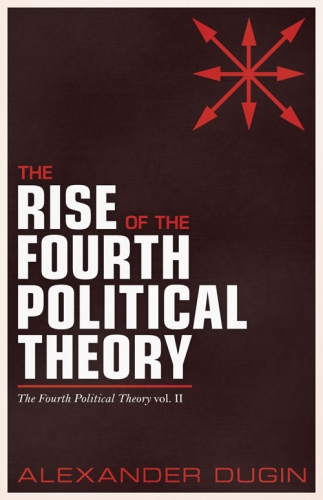 Mais qu’est-ce que « sauver » veut dire ? Sauver est apporter le salut, cela nous le savons, tout le monde le sait sans néanmoins comprendre profondément la portée d’un tel geste. Apporter le salut, s’il faut donc définir correctement cette expression, signifie faire l’effort de redonner son intégrité à une personne, la considérer en son entièreté. Il ne s’agit donc point originellement d’une action visant à la soustraire d’un danger extérieur à elle-même, donc de se permettre soi-même de la dominer de ses sentiments prétendument supérieurs. Cela est autre chose que le salut. C’est d’ailleurs l’attitude prétentieuse qui prédomine dans notre monde lorsque de l’homme l’on désire en faire autre chose que ce qu’il est ! Mais nous y reviendrons.
Mais qu’est-ce que « sauver » veut dire ? Sauver est apporter le salut, cela nous le savons, tout le monde le sait sans néanmoins comprendre profondément la portée d’un tel geste. Apporter le salut, s’il faut donc définir correctement cette expression, signifie faire l’effort de redonner son intégrité à une personne, la considérer en son entièreté. Il ne s’agit donc point originellement d’une action visant à la soustraire d’un danger extérieur à elle-même, donc de se permettre soi-même de la dominer de ses sentiments prétendument supérieurs. Cela est autre chose que le salut. C’est d’ailleurs l’attitude prétentieuse qui prédomine dans notre monde lorsque de l’homme l’on désire en faire autre chose que ce qu’il est ! Mais nous y reviendrons.